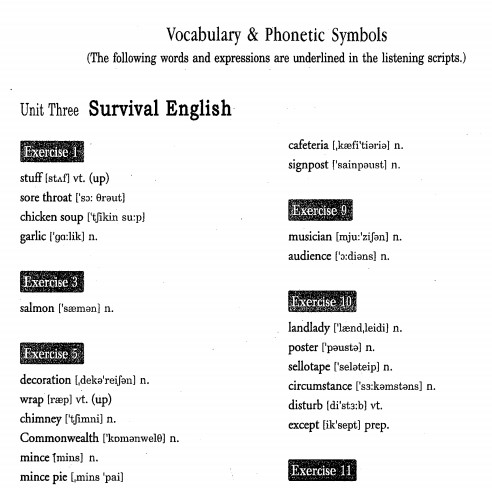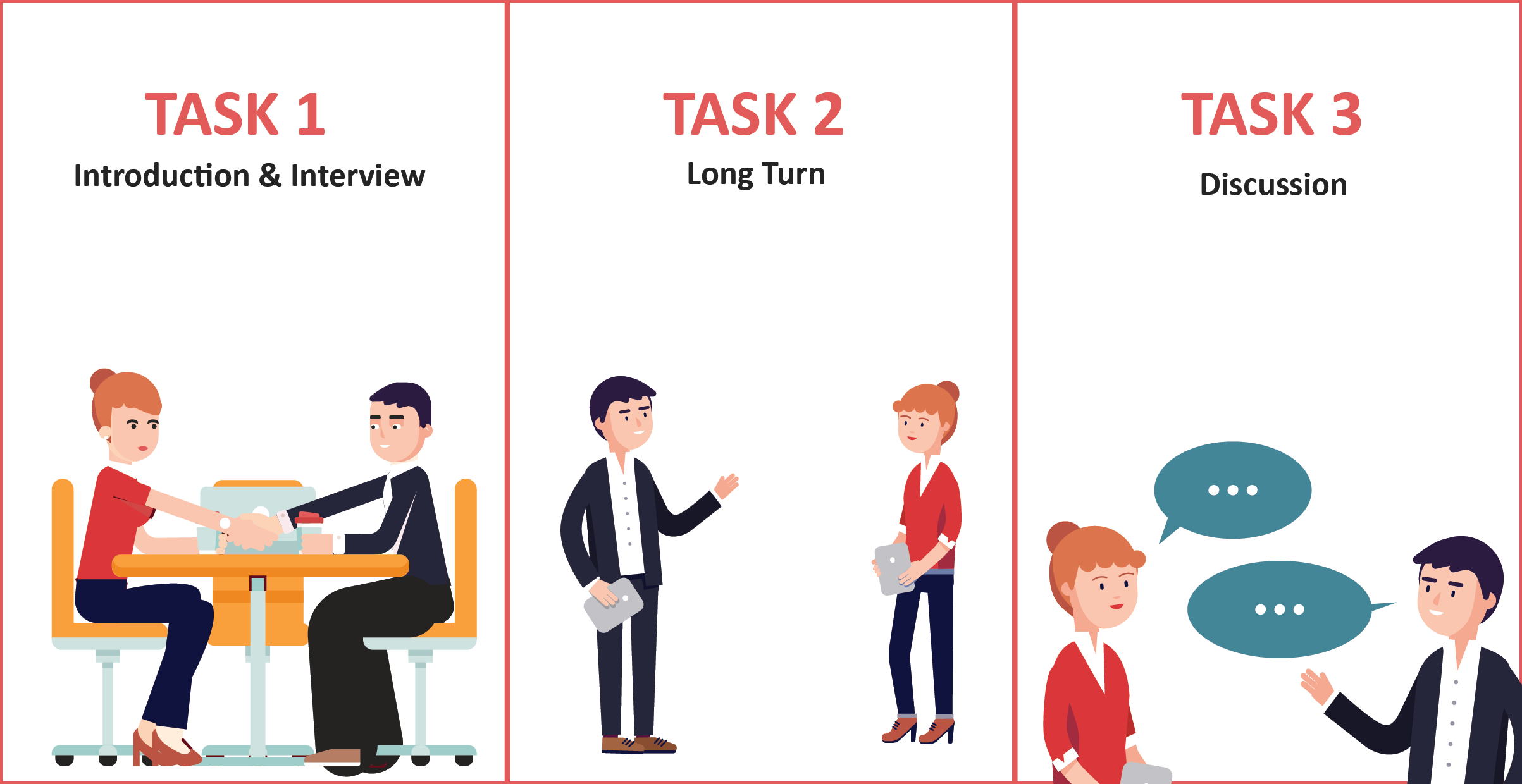Tag: bài mẫu speaking ielts
IELTS là một chứng chỉ đánh giá năng lực học tiếng Anh được ứng dụng nhiều trong cả học tập lẫn công việc. Vậy IELTS thực chất là gì? Cách tính điểm IELTS listening như thế nào? Thang điểm IELTS Listening được đo ra sao? Hãy cùng ELSA Speech Analyzer đi tìm câu trả lời cho những câu hỏi đó qua bài viết dưới đây nhé.
IELTS là gì?
IELTS là viết tắt của cụm từ International English Language Testing System hay còn có nghĩa là Kiểm tra Anh ngữ Quốc tế. Bài kiểm tra IELTS sẽ bao gồm 4 kỹ năng Nghe, Nói, Đọc, Viết. IELTS là cuộc thi quan trọng và phổ biến trên thế giới với mục đích phục vụ cho học tập, làm việc và định cư.
Hiện nay có hai thể thức thi IELTS mà bạn có thể lựa chọn là IELTS Học thuật (Academic) và IELTS Tổng quát (IELTS General). Tùy theo mục đích và nhu cầu sử dụng bằng mà bạn có thể lựa chọn thể thức thi cho phù hợp.
Cách tính điểm IELTS Listening (Số câu trả lời đúng, Band điểm tương ứng)
Vậy cách tính điểm IELTS Listening như thế nào? Hiện nay, phần thi nghe IELTS Listening sẽ gồm 40 câu hỏi. Với mỗi câu trả lời đúng, thí sinh sẽ được 1 điểm. Tổng điểm của bài thi là 40 điểm và được quy đổi sang thang điểm Listening IELTS từ 1.0 – 9.0 theo quy chuẩn của bài thi.
Dưới đây là bảng điểm quy đổi để thí sinh hiểu rõ hơn về cách chuyển đổi điểm cho phần thi Listening:
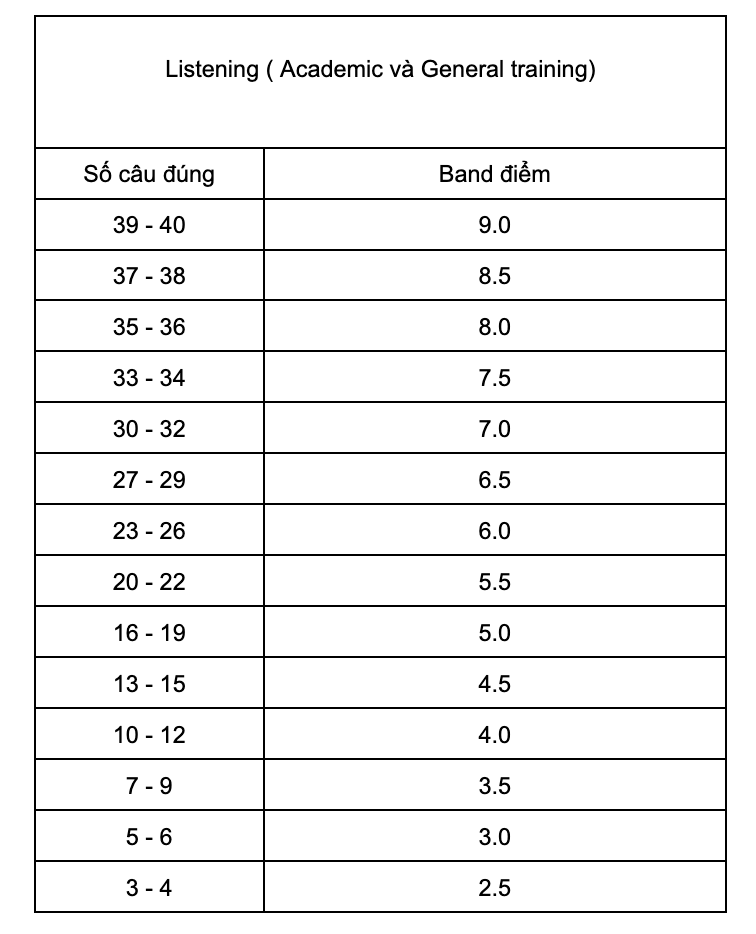
Cách tính điểm tổng 4 kỹ năng (cách tính điểm IELTS Listening)
Kết quả kì thi IELTS không có đỗ hay trượt, mỗi thí sinh sẽ nhận được giấy chứng nhận kết quả và trên đó sẽ có số điểm tương ứng.
Thang điểm bài thi IELTS là từ 1.0 – 9.0, tổng điểm bài thi sẽ được tính dựa trên điểm trung bình cộng của cả 4 kỹ năng. Bên cạnh đó sẽ có một quy ước làm tròn trong thang điểm IELTS để người thi có thể dễ dàng kiểm tra như sau:
- Điểm trung bình cộng của 4 kỹ năng là số lẻ 0.125 thì được làm tròn thành 0.0
- Điểm trung bình cộng của 4 kỹ năng là số lẻ .25 thì được làm tròn thành .5
- Điểm trung bình cộng của 4 kỹ năng là số lẻ 0.625 thì được làm tròn thành .5
- Điểm trung bình cộng của 4 kỹ năng là số lẻ .75 thì được làm tròn thành 1.0
Ví dụ: Điểm từng phần thi: 6.0 Listening, 6.5 Reading, 7.5 Speaking, 5.0 Writing
Điểm tổng IELTS = (6+6.5+7.5+5)/4 = 6.25 = 6.5 Overall
Bảng đánh giá kỹ năng qua kết quả thi IELTS
Dựa vào kết quả thi IELTS, trình độ năng lực tiếng Anh của bạn sẽ được đánh giá như sau:
| Band điểm | Đánh giá |
|---|---|
| 0 | IELTS hiện không có điểm 0. Điểm 0 tương ứng với việc thí sinh bỏ không đi thi và không có thông tin để chấm bài |
| 1.0 | Không biết cách dùng tiếng Anh: thí sinh không biết sử dụng tiếng Anh trong cuộc sống hàng ngày hoặc chỉ có thể biết một vài từ đơn |
| 2.0 | Thí sinh gặp khó khăn trong việc nói và viết tiếng Anh. Không thể giao tiếp trong cuộc sống hàng ngày ngoài việc dùng các từ đơn lẻ hoặc một số cấu trúc ngữ pháp ngắn để diễn tả mục đích tại thời điểm đó. |
| 3.0 | Có thể sử dụng tiếng anh giao tiếp trong một vài tình huống quen thuộc nhưng vẫn gặp vấn đề trong quá trình giao tiếp thực sự |
| 4.0 | Có thể sử dụng thành thạo tiếng Anh trong giao tiếp cơ bản nhưng chưa thể thành thạo trong các cuộc hội thoại phức tạp |
| 5.0 | Có thể sử dụng và nắm được phần lớn cách xử lý các tình huống nhưng vẫn còn mắc lỗi. Có thể dùng tốt tiếng Anh trong lĩnh vực riêng của mình |
| 6.0 | Mặc dù có những chỗ không tốt, không chính xác và hiệu quả nhưng vẫn có thể sử dụng ngôn ngữ thành thạo. Có thể sử dụng tốt tiếng Anh trong các tình huống quen thuộc và phức tạp |
| 7.0 | Nắm chắc ngữ pháp và từ vựng nhưng đôi khi sử dụng không phù hợp với tình huống nói. Biết cách sử dụng các cấu trúc phức tạp |
| 8.0 | Hoàn toàn nắm vững ngữ pháp, từ vựng, chỉ mắc một số lỗi cơ bản, chưa thành hệ thống. Trong một số tình huống không quen thuộc có thể không hiểu. Sử dụng tốt những chủ đề tranh luận phức tạp |
| 9.0 | Có thể giao tiếp thông thạo trong cuộc sống hàng ngày |
Review sách Basic IELTS Listening
Sách Basic Listening dành cho ai?
Đây là một cuốn sách phù hợp với những người mới bắt đầu và biết một chút về tiếng Anh. Nếu bạn chưa biết gì và không thể nghe được thì sẽ rất khó để học. Tuy nhiên nếu bạn chăm chỉ và luyện tập nhiều thì nghe cũng sẽ quen nên đừng bỏ cuộc nhé.
Sách cũng phù hợp với những ai đang cần tài liệu để tập làm quen với bài thi IELTS Listening. Sách có nhiều bài học và những mẹo thú vị để bạn có thể luyện tập và áp dụng vào bài thi của mình.
Nội dung Basic Listening – Cách tính điểm IELTS Listening
Vậy trong cuốn sách Basic Listening có những gì? Sách sẽ cung cấp cho bạn những nội dung như sau:
– Giới thiệu tổng quan về bài thi IELTS nói chung và bài thi Listening nói riêng
– Các mẹo làm bài thi Listening IELTS hiệu quả. Đây đều là những mẹo vô cùng đơn giản và dễ nhớ, giúp các bạn rèn luyện thói quan ngay từ đầu
– 5 Unit được chia theo các chủ đề quen thuộc thường gặp trong bài thi IELTS Listening như: Number, Name and Places, Survival English, Academic English, Popular Science. Mỗi Unit thường có từ 5-15 bài tập nhỏ kèm theo file nghe đi kèm để bạn tự luyện tập. Các bài học được chia thành chủ đề nên bạn có thể tổng kết từ vựng và các thông tin xung quanh bài nghe đó.
Đặc biệt, dưới mỗi bài đều có mục Notes để bạn ghi chú các lỗi sai, những điểm cần lưu ý khi luyện nghe.
– Phần đáp án để kiểm tra lại xem mình đã làm đúng được bao nhiêu câu để từ đó biết mình cần cải thiện phần nào.
Bộ sách được đi kèm đầy đủ các file audio giúp các bạn luyện nghe kỹ, nâng cao kỹ năng nghe của bản thân để đạt kết quả bài thi IELTS Listening tốt nhất.
Hướng dẫn học cùng sách Basic Listening
Vì đây là cuốn sách dành cho các bạn mới bắt đầu học tiếng Anh sách rất dễ sử dụng. Một số lưu ý để bạn học hiệu quả cùng sách Basic Listening như sau:
- Nghe từ từ từng bài, nếu chưa nghe được thì có thể nghe lại nhiều lần để quen tai. Điều quan trọng của việc luyện nghe là phải kiên trì và không bỏ cuộc.
- Nghe và chép lại thông tin đã nghe được. Sau đó mới làm bài tập và kiểm tra kết quả. Sau khi nghe và làm hết một lượt toàn bộ các bài trong sách thì hãy quay lại làm lại từ đầu để so sánh kết quả. Cách học này giúp nâng cao trình độ nghe của bạn lên rất nhiều.
- Hệ thống lại các từ vựng đã nghe được trong bài để lưu lại và ghi nhớ lâu hơn
Tổng kết
Trên đây là những thông tin về bài thi Listening IELTS, cách tính điểm IELTS Listening và cuốn sách Basic IELTS Listening. Các bạn hãy tải sách và cùng luyện tập để nâng cao điểm số cho bài thi của mình nhé. Chúc các bạn bắt đầu hành trình học Listening IELTS thuận lợi và đạt kết quả tốt nhất.
Điểm thi IELTS hiện nay đã được sử dụng và quy đổi sang điểm THPT Quốc gia để phục vụ cho việc xét tuyển vào Đại học. Sau đây ELSA Speech Analyzer sẽ chia sẻ với các bạn bảng quy đổi điểm IELTS sang điểm THPT Quốc gia 2022 chi tiết và cụ thể nhất.
Cách tính tổng điểm thi IELTS 4 kỹ năng
Điểm thi IELTS được tính theo thang điểm từ 1 – 9 và là điểm trung bình cộng của 4 phần thi Listening, Speaking, Reading, Writing. Trên phiếu điểm của thí sinh sẽ bao gồm điểm Overall và điểm của từng kỹ năng.
Quy tắc làm tròn điểm của 4 kỹ năng như sau:
- Nếu điểm trung bình cộng của 4 kỹ năng là .25 sẽ được làm tròn thành .5
- Nếu điểm trung bình cộng của 4 kỹ năng là .75 sẽ được làm tròn thành 1.0
Điều đó có nghĩa là nếu một thí sinh có điểm thi từng kỹ năng như sau: 6.0 Listening, 6.5 Reading, 5.0 Speaking, 7.0 Writing thì điểm tổng của thí sinh này sẽ là 6+6.5+5.5+7 = 25 / 4 = 6.25 = 6.5.
Bảng quy đổi điểm IELTS đầy đủ nhất
Bảng quy đổi điểm IELTS Listening
Cấu trúc bài thi IELTS Listening gồm 40 câu hỏi được chia làm 4 phần, mỗi phần gồm 10 câu hỏi với độ khó tăng dần. Nội dung của từng phần trong bài thi IELTS Listening như sau:
Part 1: là một đoạn hội thoại bao gồm các chủ đề quen thuộc trong cuộc sống hàng ngày như: thuê nhà, thuê xe, đặt phòng khách sạn, du lịch, đăng ký khoá học,…
Part 2: là một đoạn độc thoại thông báo về một chương trình, sự kiện nào đó hoặc giới thiệu về một địa điểm như bảo tàng, buổi triển lãm,…
Part 3: một cuộc thảo luận giữa giáo sư với sinh viên hoặc giữa sinh viên với học sinh về các chủ đề như bài tập lớn, bài thuyết trình,…
Part 4: bài giảng về một chủ đề học thuật như khoa học, công nghệ, lịch sử, hoá học,…
Theo đó, bảng quy đổi điểm IELTS Listening cụ thể như sau:
| Correct Answers | Band Score |
| 39 – 40 | 9.0 |
| 37 – 38 | 8.5 |
| 35 – 36 | 8.0 |
| 33 – 34 | 7.5 |
| 30 – 32 | 7.0 |
| 27 – 29 | 6.5 |
| 23 – 26 | 6.0 |
| 20 – 22 | 5.5 |
| 16 – 19 | 5.0 |
| 13 – 15 | 4.5 |
| 10 – 12 | 4.0 |
| 7 – 9 | 3.5 |
| 5 – 6 | 3.0 |
| 3 – 4 | 2.5 |
| 1 – 2 | 2.0 |
Để lại thông tin và nhận mã khuyến mãi đặc biệt chỉ có trong tháng này
Bảng quy đổi điểm IELTS Reading
Bài thi IELTS Reading của cả kỳ thi IELTS General và IELTS Academic đều diễn ra trong vòng 60 phút, giúp đánh giá khả năng đọc hiểu của thí sinh qua 3 đoạn văn.
Trong đó, bài thi IELTS General thường có nội dung liên quan đến các vấn đề xã hội hoặc cuộc sống thường ngày, không thiên về học thuật nhiều, thường là các bài được trích trong các tạp chí thời trang, các mẫu quảng cáo,…
IELTS Reading Academic thì thường tập trung vào các chủ đề học thuật hơn như: lịch sử, khoa học, công nghệ, nghệ thuật,… đòi hỏi thí sinh phải có vốn hiểu biết nhất định về các chủ đề đó, vì vậy thường khó hơn bài thi IELTS General.
Vì có sự khác biệt trong nội dung và yêu cầu nên bảng quy đổi điểm IELTS General và IELTS Academic cũng có sự khác nhau. Cùng tham khảo 2 bảng quy đổi điểm đó nhé
IELTS Reading General:
| Correct Answers | Band Score |
| 39 – 40 | 9.0 |
| 37 – 38 | 8.5 |
| 35 – 36 | 8.0 |
| 33 – 34 | 7.5 |
| 30 – 32 | 7.0 |
| 27 – 29 | 6.5 |
| 23 – 26 | 6.0 |
| 20 – 22 | 5.5 |
| 16 – 19 | 5.0 |
| 13 – 15 | 4.5 |
| 10 – 12 | 4.0 |
| 7 – 9 | 3.5 |
| 5 – 6 | 3.0 |
| 3 – 4 | 2.5 |
| 1 – 2 | 2.0 |
IELTS Reading Academic:
| Correct Answers | Band Score |
| 40 | 9.0 |
| 39 | 8.5 |
| 38 | 8.0 |
| 36 – 37 | 7.5 |
| 34 – 35 | 7.0 |
| 32 – 33 | 6.5 |
| 30 – 31 | 6.0 |
| 27 – 29 | 5.5 |
| 23 – 26 | 5.0 |
| 19 – 22 | 4.5 |
| 15 – 18 | 4.0 |
| 12 – 14 | 3.5 |
| 8 – 11 | 3.0 |
| 5 – 7 | 2.5 |
Bảng quy đổi điểm IELTS Speaking
Nhìn chung, phần thi IELTS Speaking ở cả 2 bài thi Academic và General không có sự khác biệt quá nhiều, thí sinh sẽ đều trò chuyện với giám khảo trong vòng 11 – 14 phút.
Cấu trúc bài thi được chia thành 3 phần:
- Part 1: Giới thiệu bản thân: Thí sinh sẽ được hỏi những câu hỏi liên quan đến bản thân như gia đình, sở thích, học tập,…
- Part 2: Thí sinh sẽ nói về một chủ đề mà giám khảo đưa ra. Mỗi người sẽ có 1 phút chuẩn bị và 2 – 3 phút để trình bày câu trả lời của mình.
- Part 3: Đây sẽ là phần phát triển thêm của Part 2, trong đó giám khảo sẽ đặt ra những câu hỏi đào sâu hơn về chủ đề đó. Phần này yêu cầu thí sinh cần vận dụng vốn kiến thức và khả năng từ vựng của mình để chứng minh và nâng cao band điểm Speaking của mình.
Bài thi IELTS Speaking được chấm điểm dựa trên đánh giá về các tiêu chí như sau:
- Lexical Resource: Khả năng sử dụng từ ngữ
- Grammar Range and Accuracy: Độ chính xác và sự đa dạng trong ngữ pháp
- Fluency and Coherence: Sự lưu loát, trôi chảy
- Pronunciation: Phát âm
Bảng quy đổi điểm IELTS Writing
Phần thi IELTS Writing ở 2 kỳ thi Academic và General đều đánh giá kỹ năng viết của thí sinh qua việc sử dụng từ ngữ, liên kết các câu và đoạn văn, vận dụng ngữ pháp, triển khai các luận điểm. Cả hai bài thi đều gồm 2 Task và có thời gian làm bài là 60 phút.
Tuy nhiên, sự khác biệt nằm ở chỗ, Task 1 của kỳ thi Academic yêu cầu thí sinh nhận xét biểu đồ, bảng biểu còn ở IELTS General yêu cầu thí sinh viết một bức thư.
Phần Task 2 ở cả hai kỳ thi đều yêu cầu thí sinh nêu quan điểm của mình về một vấn đề nào đó trong xã hội như công nghệ, giáo dục, văn hoá, dân số,… dưới dạng một bài luận.
Cách quy đổi điểm IELTS sang điểm thi THPT Quốc gia 2022
Theo quy định của Bộ Giáo dục & Đào tạo, chứng chỉ IELTS được phép sử dụng để xét tuyển với các thí sinh tham dự kỳ thi THPT Quốc Gia. Thí sinh sẽ được lựa chọn 1 trong 2 hình thức để quy đổi điểm IELTS sang điểm thi Đại học trong kỳ thi năm 2022.
Hình thức 1: Quy đổi điểm thi IELTS thành điểm thi môn tiếng Anh THPT Quốc gia theo thang điểm 10.
Ví dụ: Học viện Ngoại Giao thí sinh có điểm IELTS 7.0 sẽ được quy đổi thành 9.0 điểm thi môn tiếng Anh, IELTS 7.5 được quy đổi thành 9.5 điểm thi môn tiếng Anh, IELTS 8.0 trở lên được quy đổi thành 10 điểm thi môn tiếng Anh.
Hình thức 2: Xét tuyển kết hợp
Nghĩa là thí sinh sẽ xét tuyển bằng kết quả thi THPT Quốc Gia hoặc kết hợp điểm học tập trung bình 3 năm THPT cùng với bằng thi IELTS để thành một phương thức xét tuyển.
Ví dụ: Nếu thí sinh xét tuyển vào Đại học Kinh Tế Quốc Dân thì cần có chứng chỉ IELTS tối thiểu 5.5 kết hợp với điểm thi THPT Quốc gia dự kiến từ 20 điểm trở lên.
Bảng quy đổi điểm IELTS sang điểm thi THPT Quốc gia 2022
Hiện nay, do độ phổ biến của chứng chỉ IELTS nên hầu hết các trường Đại học tại Việt Nam đều mở rộng cánh cửa cho thí sinh bằng việc chấp nhận quy đổi điểm IELTS sang điểm thi THPT Quốc gia hoặc dùng bằng IELTS để xét tuyển.
Dưới đây là bảng quy đổi điểm IELTS sang điểm thi Đại học của một số trường Đại học trong nước áp dụng năm 2022:
| Trường Đại học / Điểm IELTS | 4.5 | 5.0 | 5.5 | 6.0 | 6.5 | 7.0 | 7.5 | 8.0 – 9.0 |
| Đại học Kinh tế TP HCM | 12 | 14 | 16 | 18 | 20 | |||
| Đại học Mở TP HCM | 7 | 8 | 9 | 10 | 10 | 10 | 10 | 10 |
| Đại học Kinh tế Quốc Dân | 10 | 11 | 12 | 13 | 14 | 15 | ||
| Đại học Ngoại Thương | 8.5 | 9 | 9.5 | 10 | ||||
| Học viện Báo chí & Tuyên truyền | 7 | 8 | 9 | 10 | 10 | 10 | 10 | |
| Học viện Tài chính | 9.5 | 10 | 10 | 10 | 10 | 10 | ||
| Đại học Luật TP HCM | 9 | 9.5 | 10 | 10 | 10 | |||
| Đại học Bách khoa TP HCM | 8 | 9 | 10 | 10 | 10 | 10 | 10 | |
| Đại học Công nghiệp | 8 | 9 | 10 | 10 | 10 | 10 | ||
| Đại học Bách khoa Hà Nội | 8.5 | 9 | 9.5 | 10 | 10 | 10 | 10 | |
| Đại học Luật Hà Nội | 9 | 9.5 | 10 | 10 | 10 | |||
| Đại học Quốc gia Hà Nội | 8.5 | 9 | 9.25 | 9.5 | 9.75 | 10 | ||
| Học viện Ngoại giao | 8.5 | 9 | 9.5 | 10 |
Tổng kết
Mong rằng những thông tin chia sẻ của chúng tôi đã giúp bạn hiểu được về cách tính tổng điểm 4 kỹ năng IELTS và bảng quy đổi điểm IELTS sang điểm thi Đại học 2022. Thông qua đó bạn có thể tính toán và biết cách tính điểm của các trường để chắc chắn hơn cho các dự định xét tuyển của mình.
Using useful idioms for your Speaking Test is a good way to improve your test score. Using idioms not only shows how good your vocabulary is, but also makes your speech sound more natural and fluent.
Check out ELSA Speech Analyzer‘s seven common idioms that you should prepare for your test.
1.Over the moon – to be extremely pleased or happy.
Ex: I was over the moon when I passed my speaking test.

2. A piece of cake – very easy.
Ex: Getting a band 6 in the speaking test will be a piece of cake.
Để lại thông tin và nhận mã khuyến mãi đặc biệt chỉ có trong tháng này
3. Once in a blue moon – happens very rarely.
Ex: A student will get a 9 in the IELTS writing test once in a blue moon.

4. House of cards – easy to fall or collapse
If you describe a system, organization, or plan as a house of cards, you mean that it is likely to fail or collapse.
Ex: This government could fall apart like a house of cards during the first policy discussion.
5. Soul mate – someone you trust very deeply.
Ex: My husband is not just my lover, he’s my soul mate.
6. (come) rain or shine – means something will happen regardless of weather or other difficulties.
Ex: I will be on time for the class, rain or shine. Come rain or shine, she is always smiling
7. in a nutshell: to be concise, in a few words
Ex: Here’s our proposal-in a nutshell, we want to sell the business to you.

It’s true to say that using useful idioms for your speaking test can increase your test score. However, if you use an idiom incorrectly or say it wrong, this might lower your score.
Wanna avoid that situation? ELSA is here to help you. We have just updated 14 new lessons about “Common IELTS Idioms”. Download our app to get guidance about how to pronounce these common IELTS idioms right.
Bài viết này sẽ tổng hợp 30 chủ đề thường gặp nhất trong IELTS Speaking Part 1.
Tiêu chí chấm điểm bài thi Speaking IELTS Part 1
Trong bài thi Speaking IELTS Part 1, ban giám khảo sẽ đánh giá khả năng diễn đạt của bạn về cách sử dụng ngôn từ có phù hợp với chủ đề được đưa ra hay không dựa theo mức điểm từ cơ bản đến band 9.0 của 4 tiêu chí dưới đây:
Fluency and Coherence (Trôi chảy và mạch lạc)
Nói lưu loát, trôi chảy và không lắp bắp. Có thể ngập ngừng về nội dung được hỏi, không được lắp bắp về ngữ pháp hoặc từ vựng IELTS.
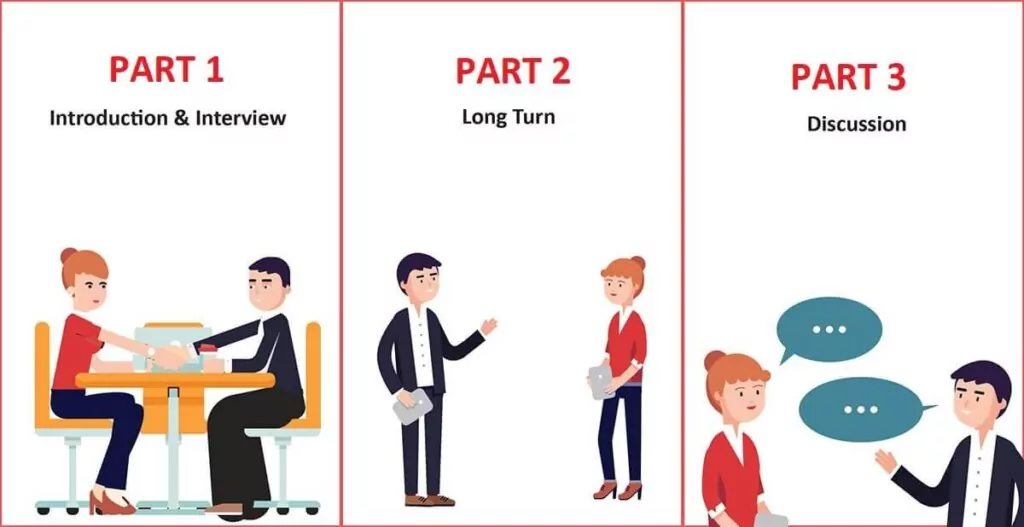
Câu trả lời có độ dài tương đối, có tính liên kết, mạch lạc. Bên cạnh nói đầy đủ nội dung cần thiết về chủ đề, bạn có thể mở rộng vấn đề để đạt số điểm cao nhất.
Lexical Resource (Khả năng dùng từ)
Khả năng dùng từ chuẩn xác về ý nghĩa theo từng tình huống. Cách truyền đạt ngôn ngữ tự nhiên, linh hoạt để thảo luận đa dạng nhiều chủ đề.
Grammatical Range and Accuracy (Ngữ pháp đa dạng và chính xác)
Sử dụng linh hoạt các loại mệnh đề, cấu trúc đa dạng, hợp lý. Cố gắng duy trì sự chính xác tuyệt đối trong cấu trúc ngữ pháp, kết hợp câu đơn và câu ghép. Tránh mắc các lỗi cơ bản về tình huống sử dụng thì (quá khứ, hiện tại, quá khứ hoàn thành,…).
Pronunciation (Phát âm)
Cách phát âm thành tố chính xác, rõ ràng về nguyên âm và phụ âm. Nhấn đúng trọng âm, ngữ điệu phù hợp hoàn cảnh. Nhịp điệu lên xuống phù hợp, không quá chậm hoặc quá nhanh, ngắt nghỉ đúng chỗ.
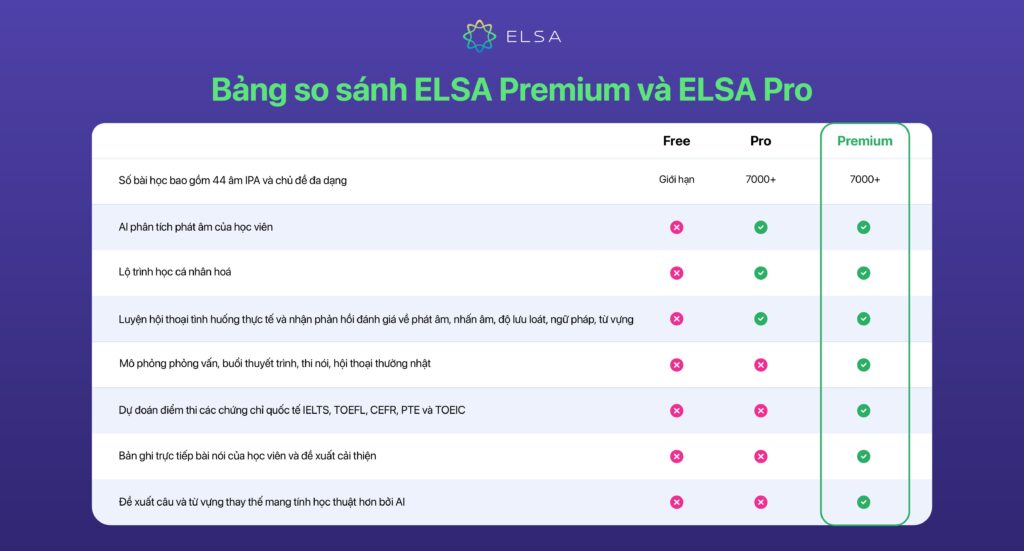
Để đáp ứng các tiêu chí chấm điểm này, thí sinh cần có sự luyện tập, chuẩn bị kỹ càng để có thể phát huy tối đa khi vào phòng thi. Một bí quyết để giúp thí sinh chinh phục bài thi IELTS Speaking Part 1 chính là luyện tập cùng gói ELSA Premium. ELSA sẽ đóng vai trò là một người bạn lắng nghe, một người thầy đưa ra các nhận xét để bạn có thể cải thiện phần trình bày của mình. Có thể nói, tất cả các tính năng luyện tập mới nhất (ELSA Pro, ELSA AI và ELSA Speech Analyzer) sẽ được tích hợp trong gói học ELSA Premium. Đặc biệt, tính năng ELSA Speech Analyzer có thể đưa ra câu hỏi và chấm điểm phần Practice Test cho các kì thi như IELTS, TOEFL, TOEIC… Vì vậy, hãy mua gói ELSA Premium ngay để bứt phá giới hạn bản thân, đạt điểm cao trong phần thi IELTS Speaking Part 1 bạn nhé!
Để lại thông tin và nhận mã khuyến mãi đặc biệt chỉ có trong tháng này
30 chủ đề thường gặp nhất trong bài thi Speaking IELTS Part 1
Phần trọng tâm tiếp theo sẽ đưa ra các nhóm chủ đề thường gặp trong bài thi Speaking IELTS Part 1 và những gợi ý về cách dùng từ vựng, ngữ pháp sao cho hợp lý theo từng đề tài để bạn đọc có sự chuẩn bị tốt cho bài thi Speaking.
Chủ đề Warm-up – Speaking IELTS Part 1
- Could you tell me your full name please?
My full name is ….., and I am also called by my facebook account on the social network which…..
- How old are you?
I am currently ….years old, to be axact, I was born in…(năm) on the ….(ngày) of…(tháng).
- Does your name have any special meaning?
Yes, my name is very special to me. You know it turns out to be a valuable message from my venerable Dad. Because my father expects me to become a warm-hearted person who can do meaningful things for society.
- What kind of person are you?
I also consider myself to be straightforward and industrious as I believe that only hard work makes you be a better version of yourself, you know “Practice Makes Perfect”. However, it is quite easy for me to lose my temper sometimes with such people who are talkative or people who fancy talking advantage of others or making fun of others as well.
Xem ngay: Tổng hợp bài nói mẫu Speaking IELTS Part 1, 2, 3 theo chủ đề mới nhất 2023
Chủ đề Hometown or birthplace – Speaking IELTS Part 1
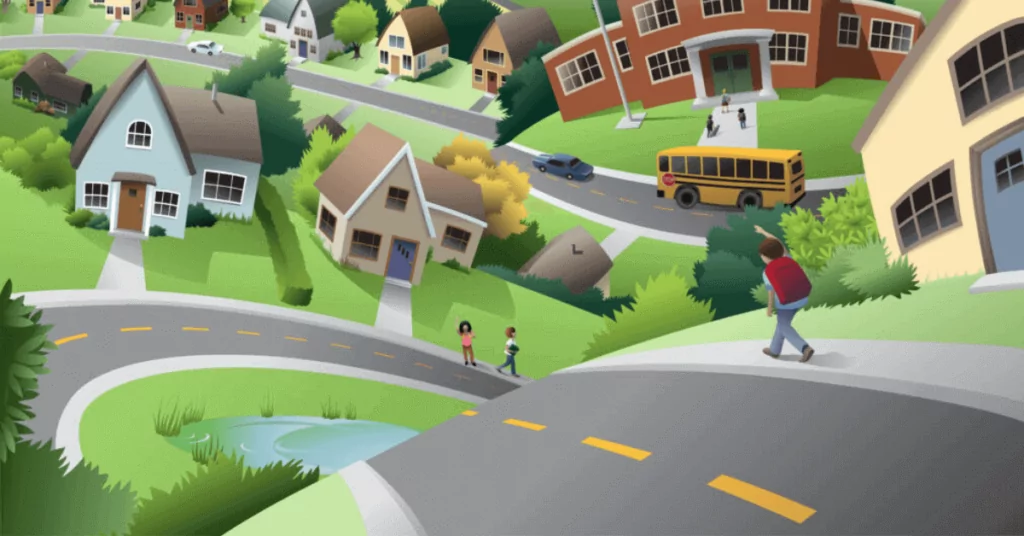
- What’s (the name of) your hometown (again)? Is that a big city or a small town?
Well, my hometown is the city of Hue, which is a small and quiet place. It is surrounded by the mountains so that it is a pretty nice place to live
- How long have you been living there?
I was born and raised there. I only moved out when I went to university in 2002. So I had lived there for about 19 years.
- Do you think you will continue living there for a long time?
Although Hue is developing a lot recently, and expanding every year, it is still a traditional town as the new architectures are built in the old-fashioned way. I think that as a tourist city, it should preserve its own characteristics to attract the tourists.
Chủ đề Hobby – Speaking IELTS Part 1
- Do you have a hobby?
Yes, of course. It is reading books. It is a perfect source of knowledge that helps me to learn more about the world. Books are the best way for me to unwind after a long day at work
- What free-time activity is the most popular for Vietnamese young people?
You know this habit is so common that so many foreign photographers come to Vietnam just to capture all the coffee shops for their own photo collection.
- Why is having a hobby important for us?
It is a crucial part of life because it helps us relax and forget about our stressful after work. Without it, such a tight work schedule can lead me to depression and worse emotional issues.
Tham khảo: Tổng hợp hobby vocabulary IELTS giúp đạt band 8.0 Part 1
Chủ đề Traveling – Speaking IELTS Part 1
- Do you like traveling?
Yes, I like it so much. I spend months all together each year to go somewhere else. I feel that it can culture my mental development.
- In which seasons do you prefer to travel ?
I think this is the best time for people to feel comfortable to go out. So, Wherever you go, you will experience a memorable trip.
- Do you think your hometown is a good place for a holiday?
You can visit the natural landscape to see the picturesque views, or you can go to the historical relics to learn about the events of Chinese history.
Chủ đề Music – Speaking IELTS Part 1
- Do you often like to listen to music?
I am a big fan of music. Yes, I have been a big fan of music all these years. I sometimes listen to music before sleeping at night for one hour and when I am driving, which will help me relax.
- What kinds of music do you like to listen to?
.I am very fond of pop music from Taiwan and Hong Kong, and I also frequently listen to some American pop singers, like the Backstreet Boys.
- How much time do you spend listening to music every day?
I always get time to listen to this music during the weekends. It is an impressive combination that can give you both nostalgic and modern feelings.
Chủ đề Sport – Speaking IELTS Part 1

- Do you play any sports?
Yes, I sometimes play football with my friends in the garden during the weekends morning
- What kind of sports would you like to try in the future?
I think I’ll try tennis because it can help me build my strength and improve my balance.
- Have you ever tried any dangerous sports?
I don’t think I have enough guts to put myself in difficult situations. So, I’m too scared to do any extreme sports.
Chủ đề Study/Work – Speaking IELTS Part 1
- Do you work or are you a student?
I’m a three-year student at Hutech university. In the future, I hope to give back to society by being a responsible high school teacher.
- Is that a popular subject in your country?
Actually, I believe it is quite popular, but only for girls. Since the job most people will apply for after studying education is teaching – girls in Japan.
- Why did you choose that university?
That reason is that my score for the university entrance exam was not high enough to get better. Another factor I should mention is that Ningbo is my hometown and the uni is quite close to now home – my parents might miss me if they don’t see me for a long period of time.
Chủ đề TV Program – Speaking IELTS Part 1
- How much TV do you (usually) watch?
I only turn on the TV to watch football match on weekends. That is once a week.
- What’s your favorite TV programme?
I am a big fan of football so I watch a lot of football matches. Besides, I enjoy watching movies, especially when I connect my computer to the TV screen and watch High Definition movies in bed, it is really enjoyable at night.
- Did you watch much TV when you were a child?
When on weekends, my parents went out to do other things, I was left alone at home with TV all day long. Therefore, I was deeply obsessed with various TV programmes, even including the adverts.
Chủ đề Living place & Accommodation – Speaking IELTS Part 1
- What kind of housing/accommodation do you live in? Do you live in a house or a flat?
I live in a pretty spacious apartment in Beijing. I live on the 14th floor of a high-rise, and it covers a little more than 150 square meters. It is a nice place. My apartment has seven rooms – one living room, one kitchen, two bathrooms and three bedrooms.
- Who do you live with? How long have you lived there?
I live with my wife, my kid and my parents. My apartment is pretty big so there is enough space for everyone. We rented the apartment four years ago.
- Which room does your family spend most of the time in?
My family spends most of our time in the living room. We’d like to sit around a set of the comfortable sofa there and chat with each other or watch TV.
Chủ đề Film – Speaking IELTS Part 1
- What is your favorite movie’s name?
I am a big fan of superhero films and I have watched almost all movies based on Marvel Comics, and which is “Avengers: Endgame”.
- What is the story of it?
Therefore, the Avengers and their allies must assemble once more and learn to put differences aside in order to work together and set things right. Along the way, they realize that sacrifices must be made and they have to do whatever it takes to restore the universe and bring those they lost back.
- When you watch it?
I went to the cinema to see it on the first day it was released in Vietnam. It starred Hollywood A-list movie stars namely Robert Downey Jr, Mark Ruffalo, but my favorite actor is Chris Evans, who played Captain America with his exceptional performance.
Chủ đề Holidays – Speaking IELTS Part 1

- Do you often go traveling?
Yes, I do. You know, it’s a great way to relax and relieve stress. Usually, I go on a trip on national holidays when I have lots of time on my hands.
- Where do you often go traveling?
I’m keen on traveling and I always want to visit some tourist destinations outside HCM cities. Well, I’m planning to travel to a coastal city this summer since I really love beaches.
- When do you often go traveling?
I always look forward to holidays because it gives me a chance to take a break and have time to spend with my family and friends.
Chủ đề Family
- Tell me something about your family.
I have a nuclear family with four members: my parents, my younger brother, and me. We also have three pet dogs. However, I am not living with them because I moved to Ho Chi Minh to study and work many years ago.
- How much time do you manage to spend with members of your family?
As I mentioned, I am living in Ho Chi Minh while my parents and brother are in my hometown, so I can’t spend a lot of time with them. Nevertheless, I try to arrange my time and go home a few times a year.
- In what way is your family important to you?
My family is the most important aspect of my life. My parents did everything possible to raise me up and ensure my education and well-being.
Chủ đề Future plans
- What are you planning to do in the next five years?
Well, I want to see myself in a position, after the next five years, where I will be able to take care of my organization smoothly. Besides, all my responsibilities would be centered on the welfare of the organization.
- What plans do you have for your future?
I have planned that I will establish a corporate agency where I would be able to employ both skilled and unskilled people which will help to improve their livelihood. I want to be a dotting father and caring husband then and would like to enjoy my time through my work, passions, and family bonding.
- Do you want to learn a skill that you do not have?
Yes, I want to learn. I am planning to learn the Japanese and China languages and I believe the languages will help me deal with the Japanese and China clients for whom I cannot deal effectively as I lack command over the languages.
Chủ đề Neighbors

- How often do you see your neighbors?
Each morning, we frequently greet each other when we meet each other. Whenever I am not occupied with schoolwork, I will visit my grandmother to talk to her. Her life experience and advice have helped me to overcome many difficulties and challenges.
- When do you meet your neighbors?
We meet every day since we live next to each other. Particularly, at the weekends, the neighbors will gather in the biggest house to hold a party or travel, which is very appealing to the children.
- Do you think the relationships with your neighbors are good?
Well, it is more of a friendly relationship because we both work for the same company and share our cars to work together. It is almost like a family friend and we do help each other out in tough situations.
Chủ đề Your favorite place
- Where is your hometown?
It is Da Nang city which is on the central coast and is one of the three biggest cities of Vietnam.
- What is special about it?
We have the green mountains surrounding the city in the west and a long fine-sand beach in the east, which offer tourists plenty of choices to see and enjoy here. Besides, I believe that the cuisine will never let them down. There are plenty of delicacies that tourists can try like Hue noodle soup, Quang style noodles,…
- Explain whether it is an ideal place to live in or not?
My city is actually a perfect option for those who would like to settle down because real estate is kind of affordable at the moment. Last but not least, the locals are friendly and helpful and will never hesitate to support the newcomers.
Kết luận
Thông tin trên ELSA Premium đã gợi ý đến bạn đọc 4 tiêu chí chấm bài Speaking IELTS Part 1 được đúc kết qua mỗi kỳ thi để mọi người có cái nhìn khái quát nhất của từng phần. Hãy luyện tập thật đều đặn, không ngừng trau dồi từ vựng để đạt kết quả tốt nhất trong vòng thi IELTS Speaking Part 1 sắp tới nhé.
Nắm vững cấu trúc đề thi Speaking IELTS và tiêu chí chấm điểm là một trong những yếu tố quan trọng, giúp bạn có sự chuẩn bị tốt nhất để đạt band 8.0 phần thi nói. Vậy Speaking IELTS có mấy phần? Bí quyết để đạt điểm cao cho từng phần là gì? Tham khảo chi tiết trong bài viết sau!
Speaking IELTS có mấy phần?
Một bài thi Speaking IELTS cơ bản sẽ diễn ra trong vòng 11-15 phút, thí sinh sẽ được trò chuyện trực tiếp với giám khảo để thể hiện khả năng phát âm, sử dụng từ vựng và ngữ pháp. Vậy speaking ielts có mấy phần? Phần thi nói IELTS được chia làm 3 phần gồm:
- Phần 1: Thí sinh sẽ được hỏi các câu liên quan đến bản thân như tên, tuổi, quê quán, sở thích… trong thời gian khoảng 4-5 phút.
- Phần 2: Bạn sẽ nhận được một chủ đề kèm theo giấy và bút, thời gian chuẩn bị trong vòng 1 phút. Tiếp theo, bạn sẽ có tối đa 2 phút để trình bày về chủ đề đó.
- Phần 3: Giám khảo sẽ đưa ra các câu hỏi liên quan đến phần 2 để bạn trả lời, thời gian khoảng 4-5 phút.
Ở bài thi Speaking IELTS, giám khảo sẽ chấm điểm dựa trên 4 tiêu chí: khả năng sử dụng cấu trúc câu đa dạng và chính xác, phát âm, từ vựng, độ trôi chảy và mạch lạc. Những tiêu chí này được quy định rất rõ ràng, chi tiết tương ứng với từng band điểm. Bạn có thể tham khảo speaking ielts có mấy phần để đặt ra mục tiêu ôn luyện phù hợp cho mình.
Cấu trúc Speaking IELTS: Part 1
Cấu trúc chung
Ở Part 1, bạn sẽ được hỏi những câu liên quan đến bản thân như tên tuổi, sở thích… Phần này sẽ được chia thành 3 phần nhỏ hơn gồm:
- Sub-section 1: Các câu hỏi về tên tuổi, quốc tịch…
- Sub-section 2: Những câu hỏi về bản thân, gia đình, công việc…
- Sub-section 3: Các câu hỏi liên quan đến sở thích.
Đây là những câu hỏi không quá khó và dễ lấy điểm, do đó bạn nên cố gắng trả lời thật trôi chảy để tạo ấn tượng tốt với giám khảo.
Để lại thông tin và nhận mã khuyến mãi đặc biệt chỉ có trong tháng này

Tổng hợp 60 đề thi Speaking IELTS Part 1 thường gặp
| Chủ đề | Câu hỏi |
|---|---|
| Hometown | – Where is your hometown? – What was it like growing up there? – Has it changed much since you were a child? – What do you like most about living there? – What kinds of things can visitors to your hometown go and see? – Do you think you will live there when you are older? |
| Friends | – Do you have many friends? [Why/Why not?] – How often do you go out with friends? [Why/Why not?] – Tell me about your best friend at school. – How friendly are you with your neighbors? [Why/Why not?] – Which is more important to you, friends or family? [Why?] |
| Names | – Did your parents choose your name(s)? – How did your parents choose your name(s)? – Does your name have any special meaning? – Is your name common or unusual in your country? – If you could change your name, would you? [Why/Why not?] |
| Food and cooking | – What sorts of food do you like eating most? [Why?] – Who normally does the cooking in your home? – Do you watch cookery programmes on TV? [Why/Why not?] – In general, do you prefer eating out or eating at home? [Why?] |
| Photographs | – What type of photos do you like taking? [Why/Why not?] – What do you do with the photos you take? – When you visit other places, do you take photos or buy postcards? [Why/Why not?] – Do you like people taking photos of you? [Why/Why not?] |
| Bicycles | – How popular are bicycles in your hometown? [Why?] – How often do you ride a bicycle? [Why/Why not?] – Do you think that bicycles are suitable for all ages? [Why/Why not?] – What are the advantages of a bicycle compared to a car? [Why?] |
| Games | – Do you play any games? [Why/Why not?] – How do people learn to play games in your country? – How do people learn to play games in your country? |
| Telephoning | – How often do you make telephone calls? [Why/Why not?] – Who do you spend the most time talking to on the telephone? [Why?] – When do you think you’ll next make a telephone call? [Why?] – Do you sometimes prefer to send a text message instead of telephoning? [Why/Why not?] |
| Your friends | – Do you prefer to have one particular friend or a group of friends? [Why?] – What do you like doing most with your friends? – Do you think it’s important to keep in contact with friends you knew as a child? [Why/Why not?] – What makes a friend into a good friend? |
| Musical instruments | – Which instrument do you like listening to most? [Why?] – Have you ever learned to play a musical instrument? [Which one?] – Do you think children should learn to play a musical instrument at school? [Why/Why not?] – How easy would it be to learn to play an instrument without a teacher? [Why?] |
| Living place | – Where do you live? – What kind of place is it? – What’s the most interesting part of your town/village? – What kind of jobs do the people in your town/village do? – Would you say it’s a good place to live? (why?) |
| Accommodation | – Tell me about the kind of accommodation you live in? – How long have you lived there? – What do you like about living there? – What sort of accommodation would you most like to live in? |
| Color | – What’s your favorite color? [Why?] – Do you like the same colors now as you did when you were younger? [Why/Why not?] – What can you learn about a person from the colors they like? – Do any colors have a special meaning in your culture? |
| Flowers | – Do you like to have flowers in your home? [Why/Why not?] – Where would you go to buy flowers? [Why?] – On what occasions would you give someone flowers? – Are flowers important in your culture? [Why/Why not?] |
| Neighbors | – How well do you know the people who live next door to you? – How often do you see them? [Why/Why not?] – What kinds of problems do people sometimes have with their neighbors? – How do you think neighbors can help each other? |
| Your favorite place | – What place do you most like to visit? [Why?] – How often do you visit this place? [Why?] – Why do you like it so much? – Is it popular with many other people? [Why?] – Has it changed very much since you first went there? [In what way?] |
| Leisure | – Do you have any hobbies or interests? [What are they?] – How did you become interested in (whatever hobby/ interest the candidate mentions)? – What is there to do in your free time in (candidate’s hometown/village)? – How do you usually spend your holidays? – Is there anywhere you would particularly like to visit? [Why?] |
| Television | – How often do you watch television? [Why/Why not?] – Which television channel do you usually watch? [Why?] – Do you enjoy the advertisements on television? [Why/Why not?] – Do you think most programmes on television are good? [Why/Why not?] |
| Entertainment | – Do you prefer relaxing at home or going out in the evening? [Why?] – When you go out for an evening, what do you like to do? – How popular is this with other people in your country? – Is there any kind of entertainment you do not like? [Why/Why not?] |
| Newspapers and Magazines | – Which magazines and newspapers do you read? [Why?] – What kinds of articles are you most interested in? [Why?] – Have you ever read a newspaper or magazine in a foreign language? [When/Why?] – Do you think reading a newspaper or magazine in a foreign language is a good way to learn the language? [Why/Why not?] |
| Laughing | – What kinds of things make you laugh? – Do you like making other people laugh? [Why/Why not?] – Do you think it’s important for people to laugh? [Why/Why not?] – Is laughing the same as feeling happy, do you think? [Why/Why not?] |
| Makeup | – Do you often wear makeup? – What does wearing makeup mean to you? – Do you give makeup as a gift? – What do you think when you see a man wearing makeup? |
| Daily Routine | – What would you like to change in your daily routine? – Are all your days the same? – Tell me about your typical weekday and your typical weekend. – What is the balance of work/study and free time in your normal day? |
| Keeping in contact with people | – How do you usually contact your friends? [Why?] – Do you prefer to contact different people in different ways? [Why?] – Do you find it easy to keep in contact with friends and family? [Why/Why not?] – In your country, did people in the past keep in contact in the same ways as they do today? [Why/Why not?] |
| Visitors | – What would you suggest a visitor should see and do in your country? – Are there any traditional arts or music you would recommend? – Tell me about the kind of foreign visitors or tourists who go to your country. – In what ways has tourism changed your country? |
| Traveling | – How did you reach the examination center? – Do you like traveling?– How do you usually travel? – What are the most common types of transportation run on the streets in your country? – Which types of transportation do people in your country often use to move? |
| Festivals | – Tell me about the most important festival in your country. – What special food and activities are connected with this festival? – What do you most enjoy about it? – Do you think festivals are important for a country? [Why?] |
| Traffic where you live | – How do most people travel to work where you live? – What traffic problems are there in your area? [Why is that?] – How do traffic problems affect you?– How would you reduce the traffic problems in your area? |
| Family | – Do you have a large family or a small family? – Can you tell me something about them? – How much time do you manage to spend with members of your family? – What sorts of things do you like to do together? – Do you get on well with your family? [Why?/why not] |
| School | – Did you go to a secondary/high school near to where you lived? [Why/Why not?] – What did you like about your secondary/high school? [Why?] – Tell me about anything you didn’t like at your school. – How do you think your school could be improved? [Why/Why not?] |
| Weekends | – How do you usually spend your weekends? [Why?] – Which is your favorite part of the weekend? [Why?] – Do you think your weekends are long enough? [Why/Why not?] – How important do you think it is to have free time on the weekends? [Why?] |
| Music | – What types of music do you like to listen to? [Why?] – At what times of day do you like to listen to music? [Why?] – Did you learn to play a musical instrument when you were a child? [Why/Why not?] – Do you think all children should learn to play a musical instrument? [Why/Why not?] |
| Dancing | – Do you enjoy dancing? [Why/Why not?] – Has anyone ever taught you to dance? [Why/Why not?] – Tell me about any traditional dancing in your country.– Tell me about some popular dancing in your country? – Do you think that traditional dancing will be popular in the future? [Why/Why not?] |
| Job | – Are you working or studying? – How long have you been working for this company? – What are your job responsibilities? – What do you like about the work you do? – What do you want to change or improve in it? |
| Birthday celebration | – What is your date of birth? – When was the last time you celebrated your birthday? – Describe a birthday party you have attended? – Do you celebrate your family members’ birthday? |
| Humor | – What types of programmes do you find funny on TV? – What types of programmes are most popular in your country? Why do you think this is the case? – What kind of things make you laugh? Why? – Do you like to make people laugh? – Do you think it is important to have a sense of humor? |
| Countryside | – Tell me about the countryside outside your town/city. – Would you like to live in the countryside or a metropolitan city in the future? [Why?] – Why do some people move to a city from a rural area? Do you know someone who did so? – Do you enjoy visiting large cities or small villages? [Why?] |
| Timing | – Is being late acceptable in your culture? – Enter your text here… – What type of excuses do you think are alright for lateness? – How do you feel when someone is late for an appointment with you? |
| Dreams | – Do you dream much at night? – Do you often remember your dreams? – Do you think we can learn anything from dreams? – Do people in your country talk about their dreams? – Do you think that dreams can come true? |
| Voices | – Do you like recording and hearing your (own) voice? – Do any members of your family have a similar voice (or, similar voices)? – Has your voice ever changed? (When?) |
| Walking | – Do you walk very much? – Do you walk more often now than (you did) in the past? – Do you think people will be walking more in the future? – What do you think are the benefits of walking? |
| Picnics | – Do you like picnics? – How often do you go on picnics? – When was the last time you went on a picnic? |
| Clothes | – What color do you like to wear? – Do you people in your country like to wear bright colors? – What are the differences between men and women’s preference in color? – What kind of clothes do you like to wear? – What kind of clothes do you never wear? |
| Handwriting | – What impression does a person’s handwriting have on other people? – Can we tell someone’s personality from their Handwriting? – Do you usually write by hand or write using a computer? – Nowadays, how do most people write things? – Do you often write with a pen? |
| Sport | – Do you like sports? – Do most people in your country like sports? – What sports do you like? – What sports do people in your country like to play? – What was your favorite sport when you were young? |
| Recycling | – Can you name products or materials that are commonly recycled? – Why have people’s attitudes towards recycling changed over the last several years? – Do you think recycling is important? |
| Changes | – What do you plan to change next year? – Do you like changes? – Are there any changes in your hometown? – Have you changed a lot since your childhood? |
| Furnitures | – Do you have a lot of furniture at home? – Have you ever received furniture as a gift? – What’s your favorite furniture? |
| Farm | – Do you think farming is important? – Have you ever visited a farm? |
| Museum | – Do you like visiting museums and art galleries? – Do you often visit museums? – When was the last time you visited a museum? – What did you learn from visiting museums and art galleries? – Do you think museums are useful for visitors to your hometown? – Do you think museums are important? |
| Rest | – How often do you take a rest? – Do you take a nap when you are taking your rest? – How do you feel after taking a nap? |
| Tree | – Do you like trees? – Would you like to live in a place that has lots of trees? – Do you think places with trees attract more visitors than places with few trees? – Do you like to go to a forest? – Is there a forest near your hometown? |
| Math | – Do you think mathematics is important? – Do you think it’s difficult to learn mathematics well? – Are girls generally good at mathematics? – Do you often use a calculator? – When do you start to learn math? |
| Work or study | – What work do you do? – What are your responsibilities? – What technology do you use at work? – Why did you choose to do that type of work (or that job)? – Do you like your job?– What do you dislike about your job? – Is it very interesting?– Do you miss being a student? – Is there some other kind of work you would rather do? – Describe the company or organization you work for |
| App | – What apps have you recently used? – What kinds of apps are you usually interested in? – What was the first app you used? – What kinds of apps would you like to use in the future? |
| Getting lost | – Have you ever lost your way? – How can you find your way when you are lost? – Can you read a map when you get lost? – Have you ever helped someone who got lost? |
| Shoes | – Do you like buying shoes? How often? – Have you ever bought shoes online? – How much money do you usually spend on shoes? |
| Headphones | – Do you use headphones? – What type of headphones do you use? – When would you use headphones? – In what conditions, you won’t use headphones? |
| Relax | – What would you do to relax? – Do you think doing sports is a good way to relax? – Do you think vacation is a good time to relax? – Do you think students need more relaxing time? |
Cấu trúc Speaking IELTS: Part 2
Cấu trúc chung
Trong Speaking IELTS Part 2, giám khảo sẽ đưa cho bạn một chủ đề gồm 3 – 4 câu hỏi gợi ý đi kèm. Bạn sẽ được cung cấp giấy bút để chuẩn bị trong vòng 1 phút. Sau đó, bạn sẽ độc thoại trong vòng 1 – 2 phút.
Đây là phần tương đối khó, do đó bạn hãy tận dụng tối đa thời gian chuẩn bị cho trước để có một bài nói trôi chảy, hoàn chỉnh.

Tổng hợp 52 đề thi Speaking IELTS Part 2 thường gặp
| Chủ đề | Câu hỏi |
| Describe a family member that you spend most time with | – Who this person is – What you like to do together – When you usually spend time together – And explain why you spend so much time with him/her |
| Describe a person who you think is fashionable | – Who the person is – What kinds of clothes this person likes to wear – How you know the person – And explain why you think he/she is fashionable |
| Describe a person you admire | – Who the person is – What he or she is like – And why you admire him or her |
| Describe a famous person that you like | – Who the person is – Why he is famous – What makes you mention specifically him/her |
| Describe a character or personality of yours | – What it is – Is it a common characteristic – How it is helpful to you – And explain why it is important to you |
| Describe a special occasion when you had a really enjoyable meal | – What the occasion was – Who was at the meal – What you ate – And explain why the meal was so enjoyable |
| Describe an embarrassing experience you have had with food | – Where you were – What happened – How you felt afterwards – And what other people thought about this event. |
| Describe a restaurant you enjoyed going to. | – Where the restaurant was – Who you went with – What type of food you ate in this restaurant – And explain why you thought the restaurant was good |
| Describe a health problem you or someone you know had | – What it was – How you had this health problem – What you or this person had to do to get better – and discuss how you/this person felt about this health problem |
| Describe a TV program you would like to watch | – What program it is – What the program is about – How often and when you watch it – And explain why you like watching this program |
| Describe an article that you read from a magazine or from the Internet about healthy lifestyle | – When you read it – Where you read it – What it is about – And if you agree with the opinions in the article |
| Describe an unforgettable advertisement that you saw | – Where you saw it – What kind of advertisement it was – What product/service was advertised – And say how you felt when you saw it |
| Describe an educational TV program that you have seen | – What this educational TV program is about – How often you watch or listen to this program – How they influence people – And explain why this program is educational |
| Describe a short trip that you frequently make (or, take) but dislike | – Where you travel from and to – How often you make this trip – Why you make this trip– And explain why you dislike this trip. |
| Describe a garden or park you enjoyed visiting | – Where it was – What it looked like – What you did there or, what people did there – And explain why you liked it. |
| Describe a house or an apartment you would like to live in | – What kind of accommodation it would be – Where it would be – Who would live there with you – And say why you would enjoy living in this place |
| Describe a place where you can read or write (not your home) | – Where the place is – How it looks like – What you do there. – And explain why you like this place. |
| Describe a garden/park you often go to | – Where it is – How it looks like – What people do there – And explain why you often go there |
| Describe a place that can be good to relax (not your home) | – Where it is – How it looks like – What people do there – And explain why you often go there |
| Describe a historical building in your country/ hometown | – Where it is – What it is used for – What it looks like – And explain why it is important to your hometown/country. |
| Describe a short- term job you’d like to do in a foreign country | – What type of work you would like to do there – What country you’d like to work in – Why you would like to work in this country |
| Describe a prize that you want to win | – What the prize is – What you need to do to get it – How you know about it– Why you want it |
| Describe a family (not your own) that you like | – Whose family this is – Where they live – Who are the family members– Why you like this family |
| Describe an area of science that interest you | – What science it is – How you got interested in it – How you learn this science – Why this science is interesting to you |
| Describe a good decision you made recently | – What the decision was and how you made it – When you made it – Why it was a good decision – How you felt about |
| Describe a book you read that you found useful | – What the book is and what it is about – Why you read it – When you read it – Why you think it’s useful |
| Describe a time when you received good news | – What this news was – When and where you heard it – Why you think it was good news |
| Describe an intelligent person you know | – Who this person is how know this person – What this person knows about – Why you think this person is intelligent – What you learned from them |
| Describe a photo of you that you like | – Where it was taken – When it was taken – How it was taken – How you felt about the photo |
| Describe a person who you think this person is helpful | – Who this person is – How you know this person – How this person helps you – Why you think this person is helpful |
| Describe a time when it was important to tell your friend the truth | – Who your friend is – What the truth was – What your friend’s reaction was – And explain why it was important to tell the truth |
| Describe a time when you saw a wild animal | – What animal it was – When you saw it – Where you saw it – And explain how you felt when you saw it |
| Describe a short journey that you often take but dislike | – Where you go – How often you do this – When you do this – And explain why you dislike it |
| Describe an ideal job you’d like to do in the future | – What it is – How you can get this job – What kinds of work you would do for the job – And explain why you want to have it |
| Describe an activity you usually do that wastes your time | – What it is – When you usually do it – Why you do it – And explain why you think it wastes your time |
| Describe an item on which you spent more than expected | – What it is – How much you spent on it – Why you bought it – And explain why you think you spent more than expected |
| Describe a person who impressed you most when you were in primary school | – Who he/she is– How you knew him/her– Why he/she impressed you most– And how you feel about him/her |
| Describe a time when you waited for something special that would happen | – What you waited for – Where you waited – Why it was special – And explain how you felt while you were waiting |
| Describe a habit your friend has and you want to develop | – Who your friend is – What habit he/she was – When you noticed this habit – And explain why you want to develop this habit |
| Describe a foreign person who you have heard or known that you think is interesting | – Who the person is – How you knew him/her – What kind of person he/she is – And explain why you think he/she is interesting |
| Describe a difficult decision that you once made | – What the decision was – When you made your decision – How long it took to make the decision – And explain why it was difficult to make |
| Describe a bicycle/motorcycle/car trip you would like to go | – Who you would like to go with – Where you would like to go – When you would like to go – And explain why you would like to go by bicycle/motorcycle/car |
| Describe a famous athlete you know | – Who he/she is – How you knew him/her – What he/she has achieved – And explain why he/she is famous |
| Describe a creative person whose work you admire | – Who he/she is – How you knew him/her – What creative things he/she has done– And explain why you think he/she is creative |
| Describe a good service you received | – What the service was – When you received it – Who you were with – And how you felt about it |
| Describe a place you visited on vacation | – Where it is – When you went there – What you did there – And explain why you went there |
| Describe a businessman you admire | – Who this person is – How you knew this person – What kinds of business this person does – And explain why you admire this person |
| Describe a time you were friendly to someone you didn’t like | – When and where it happened – Who he/she was – Why you didn’t like this person – End explain why you were friendly to him/her on that occasion |
| Describe a person who solved a problem in a smart way | – Who this person is – What the problem was – How he/she solved it – And explain why you think he/she did it in a smart way |
| Describe an exciting book that you enjoy reading | – When you read it – What kind of book it is – What it is about – And explain why you think it is exciting |
| Describe a café you like to visit | – Where it is – What kinds of food and drinks it serves – What you do there – And explain why you like to go there |
Cấu trúc Speaking IELTS: Part 3
Cấu trúc chung
Như đã đề cập ở phần đầu tiên, Part 3 sẽ là thời gian để giám khảo đưa ra các câu hỏi liên quan đến chủ đề đã được nói đến ở Part 2. Phần này đòi hỏi bạn phải vận dụng tốt các cấu trúc và từ vựng Speaking IELTS khác nhau để đạt được điểm cao.

Tổng hợp 30 đề thi Speaking IELTS Part 3 thường gặp
| Chủ đề | Câu hỏi |
| Advertising | – What are the different kinds of advertising? – What kind of advertising is most common in your country? – What are the ways in which advertisements catch the attention of viewers? – Do big companies prefer to advertise on TV or in some other ways? (Why?) – What are the good and bad points of advertisements? – Is advertising on the internet very influential? – Are any kinds of advertising in your country considered illegal? – Do you trust advertisements? (Why?/Why not?) – How do you feel about false advertising? |
| Animals and Pets | – In what ways are humans different from other animals? – What are the main roles of animals in your country? – Why is it important to conserve the world’s animal and plant species? – Which species are endangered in your country? Why? – Do you think modern farming methods are cruel to animals? – Why do many people refuse to eat meat? – What effects do you think humans have on wild animals? – What measures could we take to protect wildlife? |
| Art and culture | – How do people in your country feel about art? – Do people in your country prefer music over art? – What are some traditional art forms in your country? – How can children benefit from learning about art? – Do you think the government should provide support for art and cultural activities? |
| City and countryside | – What are the advantages of living in the countryside? – What are the disadvantages of living in the countryside? – What kinds of people live in the countryside? – What do people living in the countryside like to do? – How has life changed over time in the countryside? – Do you think it is better to live in the city or in the countryside? – Do you think landmarks make a city more famous, why? – What interesting things can we do in big cities? – What’s the difference between living in the city and in the countryside? |
| Clothes | – Do all people enjoy shopping for clothes? – Do you think it is good for people to buy expensive clothes? Why? – Why do some people like shopping with friends? – What special clothes do people in your country wear on official or formal occasions? – What is the different dress style between boys and girls? |
| Education | – What do you think of the education system in Vietnam? – How important do you think education is to an individual? – How important are the roles of theory and practice in your discipline? – What do you think are the major problems in the Vietnamese education system? – How important do you think the computer is in education today? Are there any subjects computers cannot teach today? – Which university do you think is the best in Vietnam? |
| Environment | – Are there many environmental problems in your country? – Are people concerned about environmental problems in your country? – Do you think enough is being done to deal with them? – What can individuals do to help? – Do you think older people have as much awareness of environmental problems as the younger generation? |
| Family | – Is family important in your country? – How has the size of the family changed in the last few decades in – your country? – How do you think the family will change in the future? – What role do grandparents play in the family in your country? |
| Food | – Is the food that people eat today in your country different to the food that people used to eat in the past? (if yes, in what ways has it changed?) … – How do you think the way we eat will change in the future? – How is food eaten on special occasions different from food eaten on ordinary days? – Do you think people cook too much for celebrations? How to reduce food wastage? – How do you compare the food that we now eat to the food we had in the past? |
| Health | – What are the most popular ways of keeping healthy in your country?Do you think most people worry more about their health as they get older? – Why do you think some people continue bad habits when they know that they are damaging to their health? – How can children be encouraged to adopt healthy eating habits? – Do you think people have become more health conscious in recent years? – Could governments do more to promote healthier lifestyle options? |
| History | – Do you like history? – Do you think learning history is important? – What are the benefits of museums? – Are museums in your country free of charge? – Which way is better for learning history? Through reading books or visiting museums? |
| Internet | – How has the internet changed social behavior? – Should companies check job applicants’ online profiles? – What will be the next big development online? – Do most people have a computer at home in your country? What do most people use it for? – Do you think all information on the internet is true? – How can people find reliable information on the internet? |
| Media and News | – How do newspapers market themselves for increasing sales? – What kind of marketing practices do these newspapers use? – Do you think newspapers manipulate real stores to increase their sales? – Do the TV programs and radio channels talk about the same news? |
| Reading | – For children, what do you think are the benefits of reading? – What do you think are the benefits of reading in general? – What kind of books are considered good reads in your opinion? – Do you think that people read nowadays as they did in the past? – Will electronic books ever completely replace printed books in the future? |
| Role models | – Which type of people are respected most in our society? – What happens when young people lack good role models? – What standards of behavior should teachers set? – Do you agree that you should never meet your heroes? |
| Social problems | – What are the positive social impacts of an aging population? – What are the negative economic impacts of an aging population? – What are the social and economic impacts of hunger? – Do you think that it is possible to become too competitive in sport? – Do you think criminals can change?– Is your country a safe country? |
| Sports and competition | – Why do you think sport is important? – Do you think famous sportspeople are good role models for children? – Do you agree that sports stars earn too much money? – What are the advantages and disadvantages of intensive training for young sportspeople? – Do you think that it is possible to become too competitive in sport? In what way? |
| Traveling | – How easy is it to travel around your country? – Which method of travel do you consider safest? – Has travel become safer in recent years? – What are the pros and cons of low-cost air travel? – How do you think people will travel in the future? |
| Work | – Do you think job satisfaction is more important than salary when choosing a job? – What skills do you think are needed to get a good job these days? – Do you think women should be able to do all the same jobs that men do? – How has technology changed the way we work? – What is the difference between white collar and blue collar jobs? – What jobs do you think are most valuable to society? |
| Famous | – What sorts of people are famous in your country? – How do people become famous? – Are there any differences between people who were famous a few years ago and the people who are famous today? – Do you think famous people ever have a negative influence on ordinary people? – What qualities do famous people have in common? – Through what kind of media can they be famous? |
| Weather | – Does weather affect your mood? – Does weather have any impact on people’s daily activities? – Where can people get weather reports? – How do weather reports affect people’s lives?/Why are people interested in the weather? – What do people do on rainy days and sunny days? – Has climate change affected your country? – What do you wear when it’s cold outside? – Why do people need to wear thick clothes when it’s cold outside? |
| Journey | – What kind of transportation do people in your country often use for traveling? – Do you think that decreasing the use of transportation is a good measure to protect the environment? |
| Job | – What do most people consider when finding/accepting a job? – What is more important? Job satisfaction or a high salary? – What kinds of jobs do people in your country prefer? – Do you think we need less physical work due to technology development? – Do you think robots will take over men’s jobs in the future?What kinds of jobs are most likely to be taken over by robots? |
| Describe an item on which you spent more than expected | – Do you often buy more than expected? – What do you think young people spend most of their money on? – Do you think it is important to save money? Why? – Do people buy things they don’t need? |
| Describe a person who impressed you most when you were in primary school | – Why do people always miss their childhood? – Are kids happier than adults? Why? – Why do people still remember many of their friends from primary school? – What kinds of primary school teachers will impress students? |
| Describe a time when you waited for something special that would happen | – On what occasions do people usually need to wait? – Who behaves better when waiting, children or adults? – Compared to the past, are people less patient now, why? – What are the positive and negative effects of waiting on society? |
| Describe a habit your friend has and you want to develop | – What habits should children have? – What should parents do to teach their children good habits? – What influences do children with bad habits have on other children? – Why do some habits change when people get older? |
| Describe a difficult decision that you once made | – What decisions do people usually make in their daily lives? – Which is easier, making a decision by yourself or making a decision after group discussion? – Why are many young people unwilling to follow their parents’ advice? – Why would middle-aged people tend to second-guess their own decisions? |
| Describe a bicycle/motorcycle/car trip you would like to go | – Which form of vehicle is more popular in your country, bikes, cars or motorcycles? – Do you think air pollution comes mostly from mobile vehicles? – Do you think people need to change the way of transportation drastically to protect the environment? – How are the transportation systems in urban areas and rural areas different? |
| Describe a good service you received | – What do you think of the relationship between companies and customers? – As a customer, what kinds of services would you expect to receive from a company? – What kinds of jobs involve coping with the public? – Why should companies react quickly when customers have difficulties? |
Cấu trúc đề thi IELTS kỹ năng nghe – đọc – viết
Ngoài việc tìm hiểu bài thi Speaking IELTS có mấy phần, bạn cũng cần nắm cấu trúc đề thi của 3 phần còn lại nếu muốn chinh phục được band điểm mình đề ra. Cụ thể như sau:
- Cấu trúc đề thi IELTS kỹ năng nghe: Phần này sẽ gồm 4 đoạn tương ứng với 40 câu hỏi, với thời gian hoàn thành là 40 phút. Các thí sinh chỉ được nghe một lần, giữa các đoạn sẽ có khoảng nghỉ 10 giây và cuối bài sẽ có thêm 10 phút để kiểm tra kết quả.
- Cấu trúc đề thi IELTS kỹ năng đọc: Phần này gồm 3 đoạn văn với 40 câu hỏi, có thời gian làm bài trong 60 phút. Nội dung những đoạn văn này thường được lấy từ sách báo, tạp chí với lối viết phân tích, diễn dịch hoặc miêu tả… Ngoài ra, ở phần đọc cũng có sự xuất hiện của đồ thị, biểu đồ, hình minh họa…
- Cấu trúc đề thi IELTS kỹ năng viết: Đề thi viết IELTS sẽ có 2 bài, Task 1 (150 từ) và Task 2 (250 từ). Thời gian làm bài trong vòng 60 phút, được chia làm 2 dạng học thuật và tổng quát.

Mẹo giúp bạn “chinh phục” Speaking IELTS band 8.0
Để “chinh phục” Speaking IELTS band 8.0, bạn đừng nên bỏ qua những mẹo sau đây:
- Luôn nắm rõ thang điểm đánh giá cho từng section: Phần thi Speaking IELTS nói riêng và các phần khác nói chung đều có quy định rất chặt chẽ về thang điểm. Do đó, nếu muốn đạt điểm cao, bạn cần nắm rõ speaking ielts có mấy phần, thang điểm và các tiêu chí chấm thi để chinh phục giám khảo.
- Dành thời gian luyện tập thường xuyên: Hãy tập luyện nói càng nhiều càng tốt, tạo phản xạ nói tiếng Anh thật tự nhiên. Như vậy, phần thi Speaking IELTS của bạn sẽ tự tin, lưu loát hơn.
- Tìm hiểu các chủ đề thường gặp trong phần thi Speaking IELTS: Bạn cần chuẩn bị kiến thức nền tảng thật vững chắc để chinh phục kỳ thi IELTS. Hãy tham khảo thêm các chủ đề thường gặp, những từ vựng liên quan để có thể “phát triển” bài nói một cách thoải mái, tự tin nhất.
- Sử dụng chiến thuật “câu giờ”: Trong phần 1 và 3 của bài thi Speaking IELTS, bạn gần như không có thời gian để suy nghĩ về đáp án cho các câu hỏi mà giám khảo đưa ra. Do đó, hãy áp dụng chiến thuật “câu giờ” như lặp lại hoặc biến đổi câu hỏi để suy nghĩ câu trả lời phù hợp.
- Tự sửa lỗi: Nếu bạn phát hiện mình mắc lỗi sai và chắc chắn có thể sửa lại, hãy tự điều chỉnh ngay nếu có thể. Điều này sẽ giúp giám khảo đánh giá tốt khả năng kiểm soát ngữ pháp và sử dụng từ ngữ của bạn.
Trên đây là tổng quan cấu trúc đề thi IELTS mà ELSA Speech Analyzer đã tổng hợp được. Hy vọng bạn đọc có thể xác định chính xác Speaking IELTS có mấy phần, từ đó xác định “chiến lược” để chinh phục band điểm mà mình mong muốn. Lên kế hoạch học tập ngay hôm nay để đạt điểm cao trong kỳ thi sắp đến bạn nhé!
Nếu bạn đặt mục tiêu đạt 7.0 cho phần thi speaking IELTS, đừng bỏ qua những gợi ý sau đây từ ELSA Speech Analyzer. Bài viết sẽ hướng dẫn chi tiết 8 cách nói speaking IELTS trôi chảy, giúp bạn có sự chuẩn bị thật kỹ lưỡng để chinh phục mức điểm mình mong muốn.
Bí quyết trả lời Speaking IELTS đạt điểm cao trong kỳ thi
Bí quyết khi thi nói Speaking IELTS: Nghe kỹ câu hỏi và trả lời đúng trọng tâm
Trong phần thi Speaking IELTS, điều bạn cần chú ý là nghe kỹ câu hỏi mà giám khảo đưa ra và trả lời đúng trọng tâm thay vì mở rộng quá nhiều. Việc mở rộng câu trả lời quá sớm rất dễ khiến bạn bị lạc đề và ảnh hưởng đến thời gian trả lời các câu hỏi còn lại.
Ngoài ra, bạn cũng nên yêu cầu giám khảo nhắc lại câu hỏi nếu chưa nghe kỹ hoặc khi cần thêm thời gian để tìm ý cho câu trả lời. Bạn có thể sử dụng các mẫu câu hỏi như:
- Could you please repeat the question? (Bạn vui lòng nhắc lại câu hỏi được không?)
- I’m sorry, I didn’t catch that. (Xin lỗi, tôi chưa nghe rõ.)
- Could you please say that again? (Bạn có thể vui lòng nhắc lại được không?)
Xem ngay: Tổng hợp bài nói mẫu Speaking IELTS Part 1, 2, 3 theo chủ đề mới nhất 2023
Tìm hiểu cấu trúc đề và thực hành luyện tập thường xuyên
Mỗi phần thi speaking IELTS đều có quy định về thời gian. Do đó, nếu muốn đạt mức điểm như kỳ vọng thì bạn cần tìm hiểu thật kỹ cấu trúc đề, yêu cầu cho từng phần và luyện tập thường xuyên. Điều này sẽ giúp bạn kiểm soát tốc độ nói và tránh bị quá giờ hoặc nói không đủ ý.
Bạn có thể tìm hiểu cấu trúc, tổng hợp đề thi speaking thông qua trang web chính thức của đơn vị tổ chức thi IELTS. Đồng thời, hãy đảm bảo rằng bạn đã nắm chắc những nội dung sau:
- Thời gian cho phần thi nói là bao lâu?
- Mỗi bài thi gồm bao nhiêu phần?
- Mỗi phần sẽ đề cập đến những nội dung gì?
- Các tiêu chí đánh giá cho phần thi speaking IELTS là gì?
- Ai sẽ là người chấm điểm cho phần thi của bạn?
Cách nói Speaking IELTS: Trau dồi từ và cụm từ thường gặp

Sử dụng từ vựng linh hoạt, chính xác là một trong những tiêu chí chấm thi speaking IELTS. Do đó, bạn cần dành thời gian trau dồi từ vựng tiếng Anh và các cụm từ có thể sử dụng trong nhiều trường hợp khác nhau. Chẳng hạn như:
- Khi cần thể hiện quan điểm: In my opinion, I believe that.. (theo quan điểm của tôi, tôi tin rằng…), On the other hand (mặt khác…), Having said that,… (người ta nói rằng…)
- Khi gặp một câu hỏi khó: That’s an interesting question…(thật là một câu hỏi thú vị…), I haven’t thought about it before, but I would say… (tôi chưa nghĩ về điều đó trước đây, nhưng tôi cho rằng…), I can’t say for sure, but.. (tôi không chắc, nhưng…)
Ngoài ra, bạn hãy tìm hiểu những chủ đề thường gặp trong các đề thi speaking IELTS, sau đó trang bị càng nhiều từ vựng liên quan càng tốt. Đây là điều vô cùng cần thiết để bạn có một phần thi trôi chảy, không ngập ngừng vì phải tìm từ phù hợp cho bài nói của mình.
Luyện trả lời câu hỏi “tại sao” và giải thích nghĩa của từ
Trong các phần thi speaking IELTS, các giám khảo thường đặt câu hỏi “tại sao” nhằm đánh giá trình độ của thí sinh chính xác hơn. Do đó, bạn nên dành thời gian luyện tập để phần trả lời của mình được lưu loát và đầy đủ ý, thể hiện khả năng sử dụng tiếng Anh tốt nhất. Hãy cố gắng để giám khảo không hỏi lại quá nhiều vì việc này có thể khiến bạn bị trừ điểm do chưa đạt yêu cầu.
Ngoài ra, bạn có thể luyện tập các mẫu câu trả lời IELTS Speaking và học từ vựng theo cách giải thích nghĩa. Việc này sẽ giúp bạn trang bị được kỹ năng diễn đạt tốt hơn và đủ sức thuyết phục ban giám khảo.

Nhìn vào giám khảo và chú ý những câu hỏi phụ
Hãy nhớ rằng giám khảo đã có sự chuẩn bị trước về những điều cần trao đổi với thí sinh. Do đó, họ sẽ rất ít khi đề cập đến những điều không liên quan đến bài thi.
Vậy nên, điều bạn cần làm là chú ý trả lời đầy đủ tất cả các câu hỏi phụ được nêu ra. Đồng thời, hãy chủ động nhìn vào giám khảo khi trả lời để tương tác, thể hiện sự tự tin nhằm tạo ấn tượng tốt hơn về bản thân.
Trong trường hợp có vướng mắc, hãy đề nghị giám khảo lặp lại câu hỏi và trả lời theo cách hiểu của bản thân. Tuy nhiên, bạn không nên hỏi quá nhiều lần, tránh gây lãng phí thời gian và ảnh hưởng đến những phần thi kế tiếp.
Cách nói Speaking IELTS: Không nên học thuộc câu trả lời
PPhần thi speaking IELTS nhằm kiểm tra trình độ tiếng Anh của bạn. Vậy nên, bạn cần dành thời gian để luyện tập để có thể nói một cách chủ động thay vì học thuộc những câu trả lời có sẵn. Các giám khảo sẽ dễ dàng nhận biết điều này và hoàn toàn không đánh giá cao những phần trả lời học thuộc lòng.
Trình bày ý mà bạn có thể giải thích, chỉ sửa sai khi chắc chắn
Trong quá trình thi, bạn chỉ nên trình bày những ý mà bản thân hiểu rõ và có thể vận dụng đúng từ, cụm từ vựng Speaking IELTS để giải thích. Nếu phát hiện lỗi sai làm ảnh hưởng nghiêm trọng đến nội dung, hãy tìm cách sửa chữa. Tuy nhiên, bạn nên hạn chế sửa quá nhiều vì điều này sẽ khiến bài thi kém mạch lạc, trôi chảy.
Cách nói Speaking IELTS: Thư giãn và bình tĩnh
Trước và trong quá trình thi, các thí sinh sẽ khó tránh khỏi cảm giác lo lắng. Tuy nhiên, hãy cố gắng thư giãn bằng cách mỉm cười, suy nghĩ về những điều tích cực. Đồng thời, bạn nên tự nhủ với bản thân rằng đây là cơ hội để bạn thể hiện khả năng nói tiếng Anh thay vì đang tham dự một kỳ thi. Những điều này sẽ giúp bạn nhanh chóng lấy lại bình tĩnh và hoàn thành tốt phần thi của mình.

Mẹo kéo dài thời gian và hướng dẫn cách nói Speaking IELTS
Trong quá trình chuẩn bị IELTS speaking test, bạn đừng quên tham khảo những mẹo sau để trả lời câu hỏi khó và có thêm thời gian suy nghĩ.
Cách nói Speaking IELTS chống bí part 1
Ở phần speaking IELTS part 1, bạn chỉ có vài phút để trả lời các câu hỏi do giám khảo đưa ra. Để tránh tình trạng không biết nói gì do căng thẳng hoặc gặp chủ đề khó, bạn có thể áp dụng những tips sau:
- Sử dụng trạng từ chỉ tần suất như often, sometime, never, rarely, seldom, alway… để câu trả lời được rõ ý hơn.
- Đưa ra ví dụ phù hợp để câu trả lời mang tính cá nhân hóa hơn, giúp giám khảo hiểu rõ những gì bạn muốn chia sẻ.
- Đưa ra các thông tin mang tính đối lập để kéo dài câu trả lời, sử dụng từ nối như “but” để thêm nội dung.
- Thêm cảm xúc cá nhân vào câu trả lời để tăng thêm phần thu hút.
- Nêu thêm lý do để làm rõ hơn cho câu trả lời.
- So sánh sự việc với quá khứ.
- Nói về tương lai gần.
- Đưa ra các quan điểm trái chiều.
Cách nói Speaking IELTS ăn trọn điểm Part 2
Để đạt điểm cao cho phần speaking IELTS part 2, bạn cần chú ý tận dụng tốt 1 phút chuẩn bị để viết lại các từ khóa, ý chính cho phần trả lời của mình. Đặc biệt, bạn không nên viết các câu dài vì điều này sẽ làm tốn thời gian và làm đứt quãng suy nghĩ.
Bố cục cho phần trả lời có thể dựa vào những câu hỏi phụ đi kèm trong bảng câu hỏi. Tuy nhiên, bạn vẫn nên xây dựng theo hướng mở bài, thân bài, kết luận. Trong đó, phần mở bài có thể đi thẳng vào nội dung với các cấu trúc tiếng Anh như: I prefer talking
- I prefer talking about…because…(tôi muốn nói đến… bởi vì…)
- I would love to talk about… (tôi muốn nói về…)
Ở phần thân bài, để câu trả lời đầy đủ và đúng ý, bạn nên triển khai đề cập đến quá khứ, mô tả chi tiết về vấn đề, trình bày quan điểm cá nhân và nói đôi chút về tương lai. Để đi đến kết luận, bạn có thể dẫn lại đề bài hoặc những ý chính đã đề cập trước đó, đặc biệt là cảm xúc liên quan đến nội dung đã thảo luận.
Nếu gặp phải những chủ đề khó hoặc khó khăn trong việc diễn đạt ý tưởng, bạn có thể sử dụng những cách trả lời như:
- Honestly I couldn’t care less about… but I will take a wild guess… (Thật sự thì tôi không quan tâm lắm về… nhưng tôi sẽ đoán một chút…)
- It’s not easy to talk about a brand new aspect… but I would say… (Không dễ để nói về một khía cạnh hoàn toàn mới… nhưng tôi cho rằng…)
- I have to say it’s not easy to put it into words… (Tôi phải nói rằng không dễ để trình bày ý tưởng này thành lời).
Có khá nhiều gợi ý tương tự cho những vấn đề này. Bạn có thể dành thời gian tìm hiểu và luyện tập để vận dụng thật hiệu quả trong quá trình thi speaking IELTS.

Chiến thuật/cách nói Speaking IELTS Part 3
Bài nói IELTS Speaking Part 3 thường là trở ngại của rất nhiều bạn. Tuy nhiên, bạn hoàn toàn có thể chinh phục thông qua 3 bước sau:
- Answer: Đưa ra câu trả lời trực tiếp cho câu hỏi.
- Explain: Đưa ra lời giải thích.
- Example: Nêu ví dụ
Cách trả lời này sẽ giúp bạn tổng hợp đầy đủ nội dung, không quá ngắn hoặc quá dài, đồng thời duy trì cấu trúc chặt chẽ, logic. Bên cạnh đó, bạn có thể sử dụng một số mẫu câu giao tiếp tiếng Anh để kéo dài thời gian như:
- Well, to be honest, I don’t have much knowledge about this. (Thật tình mà nói thì tôi không có nhiều kiến thức về vấn đề này.)
- I’m really not sure about the answer. (Tôi không chắc lắm về câu trả lời.)
- That’s a tough question. (Thật là một câu hỏi khó.)
- I’ve never thought about that before. (Tôi chưa bao giờ nghĩ về việc này trước đây.)
Luyện cách nói Speaking IELTS tại nhà cùng ELSA Speech Analyzer
Để trả lời trôi chảy các câu hỏi ở phần thi speaking IELTS và chinh phục thang điểm 7.0 dễ dàng, bạn đừng quên luyện tập mỗi ngày cùng ứng dụng ELSA Speech Analyzer. Với phần mềm này, bạn sẽ được Đánh giá toàn diện kỹ năng nói qua 5 yếu tố: phát âm, lưu loát, ngữ điệu, đặc biệt là ngữ pháp và từ vựng đúng chuẩn, đồng thời tham khảo các chủ đề thường gặp trong phần thi Speaking.

Nhờ sử dụng trí tuệ nhân tạo (AI), ELSA Speech Analyzer có thể giúp bạn phát hiện và sửa lỗi phát âm tiếng Anh chính xác đến từng âm tiết.
Để lại thông tin và nhận mã khuyến mãi đặc biệt chỉ có trong tháng này
Ngoài ra, ứng dụng còn chấm điểm cho từng phần luyện tập để bạn dễ dàng đánh giá trình độ của bản thân. Khi thực hiện bài kiểm tra đầu vào, bạn cũng sẽ được dự đoán điểm thi nói theo các chứng chỉ quốc tế khác nhau như: IELTS, TOEFL, CEFR, PTE, TOEIC, làm cơ sở cho quá trình luyện tập và đặt mục tiêu chính xác hơn.
Hy vọng những chia sẻ bổ ích trên có thể giúp bạn dễ dàng vượt qua phần thi IELTS Speaking. Bên cạnh đó, đừng quên luyện tập mỗi ngày cùng ELSA Speech Analyzer để luyện nói, phát âm tiếng Anh chuẩn chỉnh và sớm đạt mục tiêu đề ra!
Speaking IELTS giới thiệu bản thân (Part 1) là phần thi dạng phỏng vấn trực tiếp về những chủ đề gần gũi, quen thuộc xoay quanh cuộc sống của bạn. Do đó, nếu có sự chuẩn bị chu đáo, bạn hoàn toàn có thể giành được điểm cao trong phần này. Tham khảo ngay những mẫu trả lời và mẹo hay dưới đây để chinh phục IELTS Part 1 cùng ELSA Speech Analyzer nhé!
Cấu trúc và mẫu đề thi Speaking IELTS Part1 mới nhất
Bài thi speaking IELTS sẽ được chia làm 3 phần: Interview, Speech/Monologue và Discussion. Trong đó, phần thi speaking IELTS Part1 được thực hiện ở dạng phỏng vấn với thời lượng từ 4-5 phút. Thí sinh sẽ được yêu cầu giới thiệu về bản thân, xác nhận danh tính và trả lời một số câu hỏi về các chủ đề quen thuộc trong cuộc sống.
Các chủ đề thường xuyên xuất hiện trong Speaking IELTS Part1 bạn có thể tham khảo gồm:
Work or Study
- Do you work or study?
- What subject are you studying? Why?
- What subject do you like most?
- Do you like your work?
Sports
- Do you like playing sports?
- What sports are popular in your country?
- Do you think it is important to play a sport?
Home/Accommodation
- Where are you living now?
- How long have you been living there?
- Which room do you like most in your house?
Leisure Time/Hobby
- What do you do in your free time?
- Do you think hobbies are important?
- Which hobby do you like to try in the future?
Xem ngay: Tổng hợp hobby vocabulary IELTS giúp đạt band 8.0 Part 1
Public Holiday
- What’s the most important public holiday in your country?
- What’s your plan for New Year’s Eve?
- What do you usually do on public holidays?
The place you live in
- Do you live in the city or in the countryside?
- Have you ever lived in the countryside?
- What kind of city do you like?
- Do you prefer the city or the countryside?
History
- Do you like to learn about history?
- What historical events do you find interesting?
- Do you think history is important?
Fashion
- What type of clothes do you enjoy wearing?
- Do you enjoy buying clothes?
- Has your style of clothing changed compared to 10 years ago?
- What types of clothes do people in your local area enjoy wearing?
Mẹo giúp bạn “chinh phục” giám thị trong phần thi IELTS Speaking Part 1
Cấu trúc ngữ pháp thông dụng
Sự linh hoạt trong việc lựa chọn và sử dụng các cấu trúc ngữ pháp trong phần thi nói sẽ giúp bạn dễ đạt điểm cao hơn.
Tuy nhiên, bạn không nhất thiết phải sử dụng các cấu trúc quá phức tạp, dễ dẫn đến sai sót. Thay vào đó, bạn chỉ cần chọn những cấu trúc thông dụng như các thì, câu so sánh, mệnh đề quan hệ, câu cảm thán…và vận dụng thật linh hoạt.
Học ngữ pháp Speaking IELTS giới thiệu bản thân trong những bài viết sau:
- Các thì trong tiếng Anh
- Thì hiện tại đơn
- Thì hiện tại hoàn thành
- Thì hiện tại tiếp diễn
- So sánh trong tiếng Anh
- Mệnh đề quan hệ
Những lưu ý cần nắm để lấy trọn điểm Speaking IELTS giới thiệu bản thân
Để đạt điểm cao ở phần thi Speaking IELTS giới thiệu bản thân, bạn nên chú ý những vấn đề sau:
- Nên sử dụng những mẫu câu đơn giản, thông dụng nhưng cần đúng cấu trúc từ quá khứ đến hiện tại.
- Nên trả lời vào thẳng trọng tâm vấn đề, không vòng vo. Tuy nhiên, bạn cần chú ý là không nên trả lời quá ngắn.
- Hãy thể hiện sự thân thiện và tự tin thông qua ngôn ngữ hình thể phù hợp như ngồi ngay ngắn, không gãi đầu, vung tay hoặc đảo mắt liên tục.

Tổng hợp mẫu câu Speaking IELTS giới thiệu bản thân hay nhất
Để có sự chuẩn bị chu đáo nhất cho phần giới thiệu bản thân khi thi Speaking IELTS Part1, bạn có thể tham khảo những mẫu câu được gợi ý dưới đây:
Speaking IELTS giới thiệu bản thân – Mẫu câu chào hỏi
Để bắt đầu bất cứ cuộc trò chuyện nào trong tiếng Anh, bạn cần chào hỏi trước. Một số mẫu câu phổ biến trong trường hợp này gồm:
- Nice to meet you!
- Good to meet you!
- Pleased to meet you!
- Happy to meet you!
- Great to meet you!
- Good morning/ good afternoon/ good evening!
Mẫu câu giới thiệu tên bằng tiếng Anh
Tiếp theo sẽ là phần giới thiệu tên. Bạn có thể sử dụng những cấu trúc sau:
- My name is / I’m + Tên
- My full/ first/ last name is + Họ và tên
Bạn có thể mở rộng phần trả lời này bằng cách giới thiệu thêm tên gọi thường ngày hoặc biệt danh theo cấu trúc:
- You can call me/ Please call me / Everyone usually calls me + Biệt danh, tên bạn muốn được gọi.
- My nickname is + Biệt danh
Ví dụ:
- My name is Huong, but you can call me Jane. (Tên tôi là Hương nhưng bạn có thể gọi là Jane cũng được.)
- My full name is Hoang Thanh Tam. (Tên đầy đủ của tôi là Hoàng Thanh Tâm.)
Mẫu câu giới thiệu tuổi tác
Để giới thiệu tuổi tác, bạn có thể áp dụng mẫu câu:
- I’m + số tuổi + years old.
- I’m over/nearly/almost + tuổi
- I’m around your age.( Tôi tầm tuổi bạn)
- I’m in my early twenties/ late thirties.( Tôi ở độ tuổi hai mươi, ba mươi).
Ngoài ra bạn có thể chia sẻ thêm về ngày sinh nhật với mẫu câu:
- My birthday is on + ngày sinh
Ví dụ:
- I’m almost 30. (Tôi gần 30 tuổi)
- I am 25 years old. (Tôi 25 tuổi)
Mẫu câu giới thiệu địa điểm sinh sống
Có rất nhiều cách khác nhau để nói về địa điểm sinh sống của bạn trong phần thi speaking IELTS giới thiệu bản thân.
- I’m from /I come from + quê của bạn
- My hometown is / I’m originally from + tên quê của bạn
- I’m + Nationality (quốc tịch)
- I was born in + nơi sinh của bạn
- I live in/ My address is + địa chỉ sinh sống hiện tại của bạn
- I live on + tên đường + street.
- I live at + địa chỉ nơi bạn sinh sống
- I spent most of my life in + nơi bạn sinh sống nhiều nhất
- I have lived in + địa chỉ sinh sống + for/ since + thời gian (năm/tháng/ngày)
- I grew up in + nơi bạn lớn lên.
Lưu ý: Khi đề cập đến địa điểm sinh sống bạn dùng “in” trước tên tỉnh, đất nước. Riêng cụm “I’m from” không cần dùng giới từ vì đã có “from”.
Ví dụ:
- I was born in Da Nang. (Tôi sinh ra ở Đà Nẵng.)
- I have lived in Hue for 4 years. (Tôi từng sống ở Huế 4 năm.)
Xem ngay: Tổng hợp bài nói mẫu Speaking IELTS Part 1, 2, 3 theo chủ đề mới nhất 2023
Mẫu câu giới thiệu phương thức liên lạc
Trong một số trường hợp cần trao đổi phương thức liên lạc, bạn có thể dùng mẫu câu:
- My phone number is + SĐT
- My email address is + địa chỉ email.
- My Facebook account is + tên.
Ví dụ:
- My phone number is 0905 763 xxx. You can contact me on this number. (Số điện thoại của tôi là 0905 763 xxx. Bạn có thể liên lạc với tôi theo số này.)
- You can contact me on Facebook. My Facebook account is… (Bạn có thể liên lạc với tôi qua Facebook. Tài khoản Facebook của tôi là…)
Speaking IELTS giới thiệu bản thân – Công việc
Để giới thiệu về tình trạng công việc, bạn có thể áp dụng những mẫu câu sau:
- I am a/ an hoặc I work as a/ a + nghề nghiệp.
- I work for (tên công ty) … as a/ an + nghề nghiệp.
- I am out of work: Tôi đã nghỉ việc.
- I earn my living as a/ an + nghề nghiệp: Tôi kiếm sống bằng nghề …
- I am looking for a job. / I am looking for work: Tôi đang tìm việc làm.
- I’m retired: Tôi đã nghỉ hưu
- I would like to be a/an / I want to be a/an + nghề nghiệp: Tôi muốn trở thành một…
- I used to work as a/an + nghề nghiệp + at + tên công ty/nơi làm việc: Tôi đã từng làm (công việc) tại…
- I just started as (nghề nghiệp/vị trí) in the (phòng ban) department: Tôi mới bắt đầu công việc (tên nghề nghiệp/vị trí) ở (tên phòng ban).
- I work in/at a + nơi làm việc
- I have been working in (tên tỉnh/thành phố) for(số năm).
Ví dụ:
- I used to work as a supervisor at ABC restaurant. (Tôi từng làm giám sát tại nhà hàng ABC).
- I have been working in HaNoi for 5 years. (Tôi từng làm việc tại Hà Nội trong 5 năm.)
Từ vựng về một số nghề nghiệp phổ biến:
- Teacher /ˈtiː.tʃɚ/: Giáo viên
- Doctor /ˈdɑːk.tɚ/: Bác sĩ
- Nurse /nɝːs/: Y tá
- Secretary /ˈsek.rə.ter.i/: Thư ký
- Manager /ˈmæn.ə.dʒɚ/: Quản lý
- Policeman /pəˈliːs.mən/: Cảnh sát
- Builder /bɪld/: Thợ xây
- Engineer /ˌen.dʒɪˈnɪr/: Kỹ sư
- Businessman /ˈbɪz.nɪs.men/: Người làm kinh doanh
- Firefighter /ˈfaɪrˌfaɪ.t̬ɚ/: Cứu hỏa
- Postman /ˈpoʊst.mən/: Nhân viên bưu điện
- Architect /ˈɑːr.kə.tekt/: Kiến trúc sư
- Farmer /ˈfɑːr.mɚ/: Nông dân
Speaking IELTS giới thiệu bản thân – Gia đình
Một số mẫu câu giới thiệu gia đình đơn giản:
- There are + (số lượng) + people in my family. They are + member family
Member Family (các thành viên trong gia đình): Parents (bố mẹ), sister (chị/em gái), brother (anh/em trai), grand mother/father(ông bà)…
- There are + (số lượng) + of us in my family.
- My family has + (số lượng) + people.
- I live with my + người sống cùng (có thể là gia đình, bạn bè, họ hàng…)
- I am the only child. (Tôi là con một)
- I don’t have any siblings. (Tôi không có anh chị em)
- I have + (số lượng) + brother(s) and + (số lượng) + sister(s).
Ví dụ:
- My family has 7 people. (Gia đình tôi có 7 người.)
- I live with my younger brother. (Tôi sống với em trai.)

Speaking IELTS giới thiệu bản thân – Sở thích
Mẫu câu giới thiệu sở thích:
- I like/ love/ enjoy/ + tên hoạt động, sở thích ( sports, movies…)
- I am interested in… (Tôi hứng thú với …)
- I am good at …(Tôi giỏi về…)
- My hobby is/ My hobbies are + sở thích (Sở thích của tôi là…)
- My favorite sport/ color/movies is… (Môn thể thao/màu sắc/bộ phim yêu thích của tôi là…)
- I have a passion for …(Tôi có đam mê với…)
- My favorite place is … (Nơi yêu thích của tôi là …)
- I don’t like/ dislike/ hate …:(Tôi không thích/ghét…)
- My favorite food/ drink is …(Món ăn / uống yêu thích của tôi là…)
Ví dụ:
- My favorite movies are cartoons. (Thể loại phim yêu thích của tôi là hoạt hình.)
- My favorite drink is coffee. (Thức uống yêu thích của tôi là cà phê.)
Từ vựng về sở thích/hoạt động:
- Reading /ˈriː.dɪŋ/: đọc sách
- Painting /ˈpeɪn.t̬ɪŋ/: hội họa
- Drawing /ˈdrɑː.ɪŋ/: vẽ
- Shopping /ˈʃɑː.pɪŋ/: mua sắm
- Singing /ˈsɪŋ.ɪŋ/: hát
- Dancing /dæns/: nhảy
- Travelling /ˈtræv.əl.ɪŋ/: du lịch
- Camping/ˈkæm.pɪŋ/: cắm trại
- Hiking /ˈhaɪ.kɪŋ/: đi bộ
- Playing computer games: Chơi game trên máy tính
- Going to the cinema: Xem phim tại rạp
- Playing with friends: Gặp gỡ với bạn bè
- Chatting with best friends: trò chuyện với bạn thân
- Surfing the Internet: lướt Internet
- Collecting stamps/coins : Sưu tập tem, tiền cổ
- Going to the park/ beach/ zoo/ museum : Đi chơi công viên, biển, sở thú…
- Listening to music: Nghe nhạc
Từ vựng về các các thể loại phim:
- Action movie /ˈæk.ʃən ˌmuː.vi/: phim hành động
- Comedy /ˈkɑː.mə.di/: hài
- Romance /roʊˈmæns/: lãng mạn
- Horror /ˈhɔːr.ɚ/: kinh dị
- Document /ˈdɑː.kjə.mənt/: tài liệu
- Thriller /ˈθrɪl.ɚ/: kinh dị
- Cartoon /kɑːrˈtuːn/: hoạt hình…
Từ vựng về các môn thể thao:
- Volleyball /ˈvɑː.li.bɑːl/: bóng chuyền
- Badminton /ˈbæd.mɪn.tən/: cầu lông
- Tennis /ˈten.ɪs/: quần vợt
- Yoga /ˈjoʊ.ɡə/: tập yoga
- Cycling /ˈsaɪ.klɪŋ/: đạp xe
- Running /ˈrʌn.ɪŋ/: chạy bộ
- Fishing /ˈfɪʃ.ɪŋ/: câu cá
Bài mẫu giới thiệu bản thân bằng tiếng Anh gây ấn tượng với người nghe
Để luyện tập cho phần thi Speaking IELTS giới thiệu bản thân, bạn có thể tham khảo một số bài mẫu sau:
Bài mẫu Speaking IELTS giới thiệu bản thân trong part 1
My name is Phong. I’m currently residing in Ha Noi, Vietnam’s capital city.
I am pursuing a double degree in business and economics at a local institution. At the moment, I’m about halfway through my course and in the middle of my studies.
My objective after graduating is to start working anywhere in Ha Noi’s downtown area. However, I have always dreamed of working in global settings, and it would be ideal if I could work for a large international firm in Australia or Canada after gaining some experience.
Bài mẫu giới thiệu bản thân khi đối thoại bằng tiếng Anh
Hello, my name is Quân. I’m a freshman at the University of Pedagogy, 19 years old. Physics is my major. I was born in Bac Ninh, and this is my first visit to Ha Noi, so I’m looking forward to learning new things.
I’m a huge soccer lover who spends at least once a week playing with my friends. I’m a generous and easygoing guy, yet I’m a competitive perfectionist when it comes to working.
I’m looking forward to starting college, as it will be a brand new chapter in my life.
Bài Introduce Yourself mẫu khi phỏng vấn xin việc
My name is Mai Linh. I am a 28-year-old single woman. I was born and raised in Ha Noi, but I’ve spent the last five years working in HCM City.
I have a bachelor’s degree in economics and four years of administrative and human resource management expertise. Dealing with human behavior has always been appealing to me.
I’m a sensitive person who can rapidly pick up on other people’s psyche. I enjoy reading the newspaper and listening to music in my spare time.
Essay giới thiệu bản thân cho học sinh

My name is Le Ngoc Chau, and I’d like to welcome you all to my presentation.
I am 14 years old and reside in Dong Da, Hanoi. My family consists of my parents, older brother, and me.
I am studying in class 9B, Chu Van An School. I have a lot of friends at school, all of whom are very smart and nice. Everyone says I’m a very outgoing, high-energy, and sociable kid, which is why they adore me.
Physics and English are two of my favorite subjects. Cooking and reading are two of my favorite hobbies. I take online piano classes in my leisure time. In the future, I want to become a renowned pianist.
Bên cạnh việc nắm vững các cấu trúc câu giới thiệu bản thân, bạn đừng quên luyện tập thường xuyên cùng ELSA Speech Analyzer để nâng cao phản xạ và sự trôi chảy cho phần thi Speaking IELTS Part1.
Để lại thông tin và nhận mã khuyến mãi đặc biệt chỉ có trong tháng này
Ngoài việc đưa ra các tình huống riêng cho phần thi Speaking IELTS, ELSA Speech Analyzer sẽ đưa ra nhận xét và chấm điểm để giúp bạn biết được phần còn hạn chế của bản thân và có kế hoạch cải thiện phù hợp.
Truy cập tính năng “Vượt qua kỳ thi IELTS” trên ELSA Speech Analyzer để có sự chuẩn bị tốt nhất cho phần thi nói ngay hôm nay bạn nhé!
